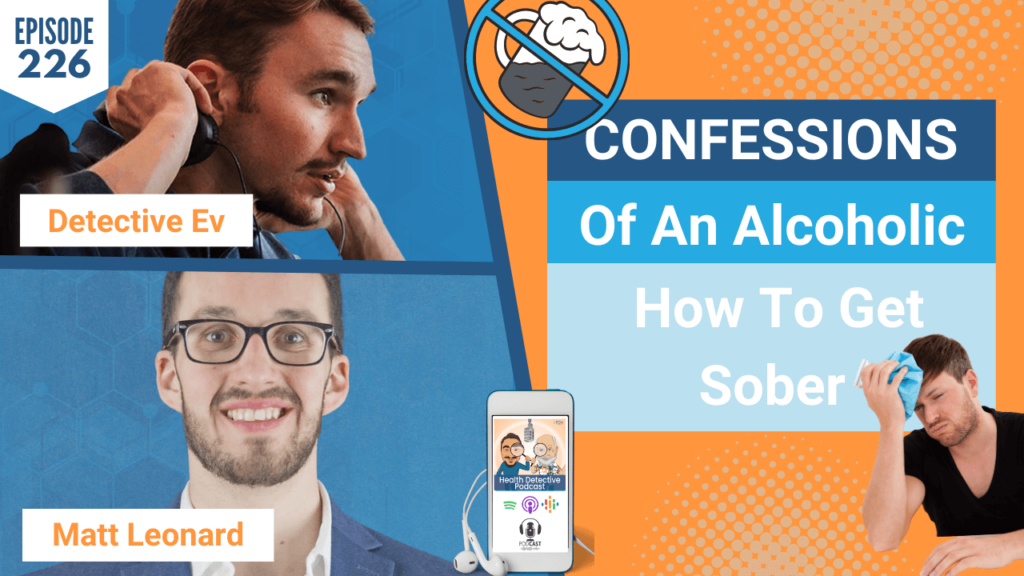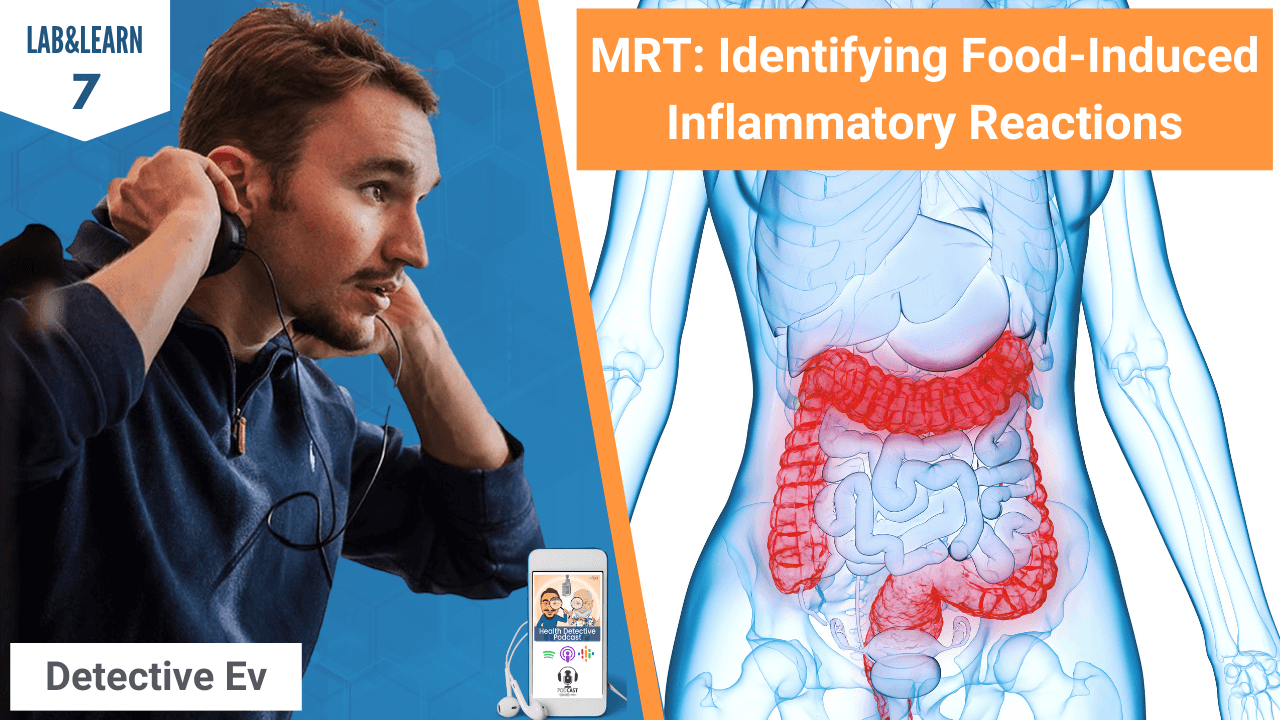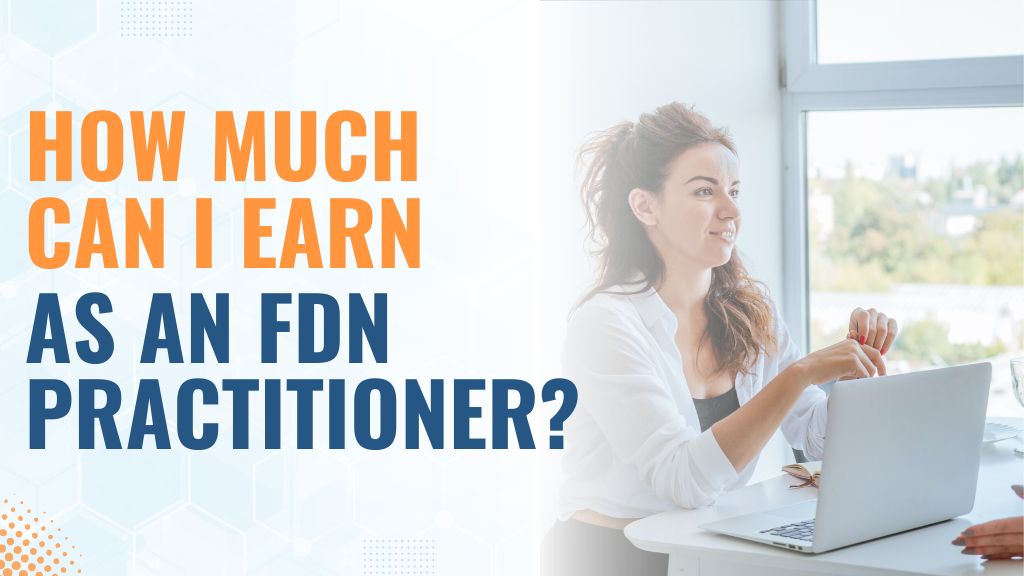Introduction
[00:00:00] Detective Ev: Hello my friends. Welcome back to another episode of the Health Detective Podcast by Functional Diagnostic Nutrition. My name is Evan Transue, aka Detective Ev. I will be your host for today’s show on how to get sober.
We’re switching it up a little bit today, but I am nearly positive that every single person in our audience can get something from this episode. Otherwise, I would not have brought this individual on. This is not someone who overcame anything using functional medicine or any type of natural medicine, to be honest. That is not only a difference on our show, I think that’s the first time it’s ever been featured in 200 something episodes.

So, why the heck am I bringing him on? What are we doing here? The reason I’m bringing this guy on is because I saw a post of his and realized what he is doing is something that will help a lot of people. What he has been through and the way he went through it is something that affects all of us, either directly or indirectly. If you know more than 10 people, this absolutely, at the very least, affects you indirectly. We’re going to be talking about legitimate addiction and substance abuse today.
Matt Leonard was someone that I went to high school with. We never said a word to each other. I don’t want you to think this is some biased thing where I’m like friends with this guy and we hang out all the time. I have seen him one time in person other than maybe walking past each other in the hallway. But we had a class of 500 kids almost at the high school that I went to.
How to Get Sober: Addiction is a Mental Health Issue
Because of this, it wasn’t particularly unheard of to not know someone or not talk to someone throughout all of high school. We saw each other one time after that at a meeting that a mutual friend was hosting. I think I shook his hand, talked to him for a few minutes. But I always just want to be clear that never am I bringing someone onto the show because I know them.
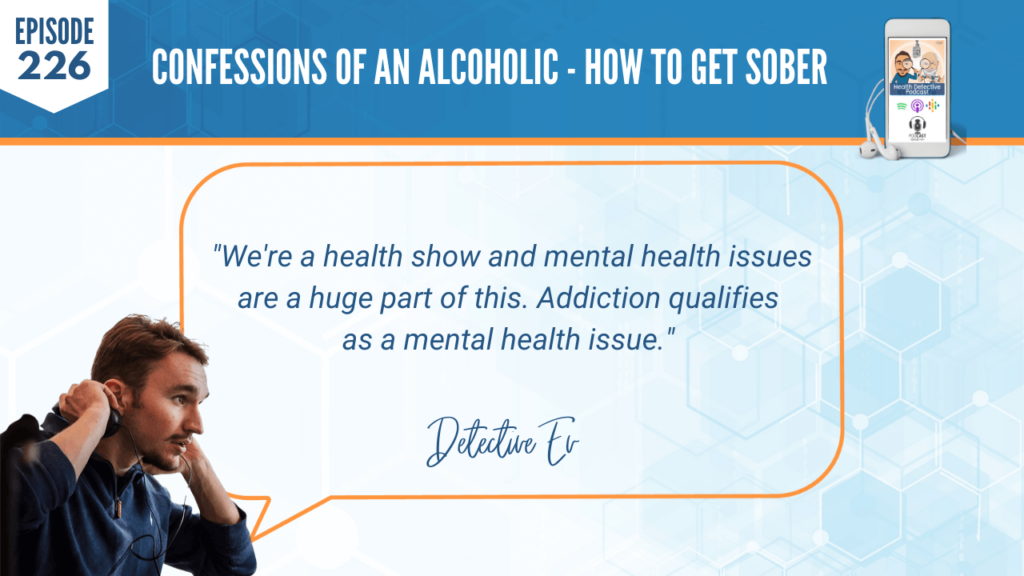
I do bring on people that I know, but it is because they have something else going on. Maybe they went through FDN, maybe they’re into health. Maybe they’re into what Matt’s into today. We’re a health show and mental health issues are a huge part of this. Addiction qualifies as a mental health issue. So, even though this might not be a story today about someone overcoming things with functional health, I felt very inclined to put it on.
If you guys really don’t want me ever putting something like this on again, just shoot us a message on Instagram at fdntraining and we won’t do things like this. It’s not going to be every month; it’s not even going to be every few months. But for right now, I think it’s too important. I’ve heard too many stories, especially after the pandemic of families struggling, not fully getting the perspective of someone who goes through this or having someone like Matt in their life or being someone like Matt.
He never really had these issues even at a young age. He’s one of the statistically rarer people that developed this at an older age, not that old, but like older than teenage years, that’s for sure. It’s a powerful story. It’s really a powerful insight and I’m so excited to see what he’s doing.
How to Get Sober: Many Things Come with Addiction
I hope that you guys, after you listen, go throw him a follow if you feel so inclined to do it. Or just show him some support, let him know that the episode helped you in some way if it did. Without further ado, let us get to today’s episode.
Alright. Hello there, Matt. Thank you so much for coming on to the Health Detective Podcast. How are you?
Matt Leonard: I’m doing great.
Detective Ev: This is an interesting one guys. And I feel like I say this every other time. One, I do think they’re all interesting. But two, this is actually uniquely interesting, and I think that’ll become very evident pretty quickly if it hasn’t already, just by the title of this one today.

So, we’re not talking to someone who necessarily went through like an autoimmune disease or cancer or some of the things that we normally talk about. But one of the things we do talk about on here is the mental health side. That’s a huge part of my story. I overcame these things using functional medicine. But one thing that we have not really dove into in like huge depth is addiction and the many things that can come with that.
Matt and I, this is what’s weird, we’re from the same hometown. Did we even talk in high school? Like I can’t picture us having a conversation.
[00:03:58] Matt Leonard: It’s really funny, actually. I was literally thinking about that like 30 minutes ago.
How to Get Sober: Old Schoolmates Reunited
It’s crazy how life works. We literally went to the same high school, there’s a chance we were sitting in the same class together, but I don’t think we ever said a word to each other. We were in completely different social groups.
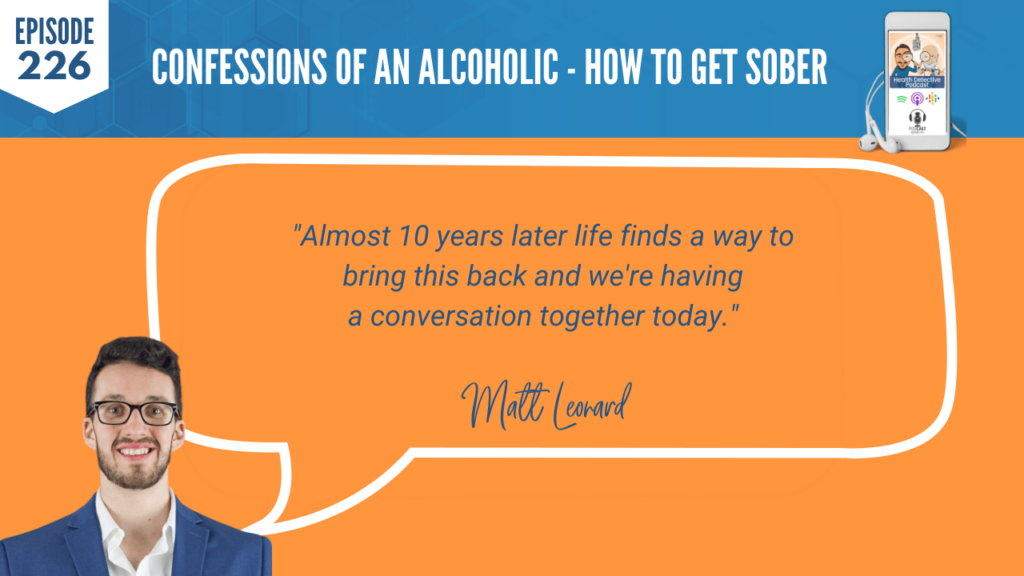
Almost 10 years later life finds a way to bring this back and we’re having a conversation together today.
[00:04:18] Detective Ev: Yeah, and I’m glad to just see both of us at this point are doing really well. Because, I mean, in high school I just can’t picture you, but I wasn’t an approachable character. I was in my own head, struggling with my own stuff substance wise, mental health wise. I got the shaved head, no beard. I actually look more approachable with this than without it. I kind of just looked like a not friendly person.
So, things have worked out very well. And if I’m not mistaken, where we got brought together is through Casey. But were you at the accountability club thing? Is that what it was?
[00:04:44] Matt Leonard: Yeah, so we started that. I think that seemed to fizzle out quickly. But it’s funny, the dude that was my accountability buddy randomly texted me like two years later and asked me a question. I was like, what’s up man? He is like, oh, sorry, wrong Matt. I was like, all right, cool. Good catching up with you. But yeah, we kind of got connected through that.
It’s really cool because you’re someone I’ve kind of followed a little bit from a distance for a while. Like I think it’s awesome to see you kind of doing your own thing.
How to Get Sober: Self-Absorbed
Going back to the high school, I had no idea what you were going through in high school, which probably a lot of people didn’t. It’s just, you never really know what someone’s going through. While I don’t really ever remember saying like, this guy looks unapproachable, I’m not going to talk to him, we were just completely separate and were our own different people.
But I went through stuff in high school, probably not as bad as what you were going through. I was the kid in high school, I just wanted people to like me. I wanted to be cool. At the end of the day, I was like a nerd. I was good at school, not that good at sports, but was trying to get girls, not getting girls. I was trying to make friends with the popular kids. I was like on the outskirts of that.

You’re just so kind of caught up in your own realm and your own thoughts that you’re not really concerned about what’s going on with anybody else. So, I think it’s really cool that we, almost a decade later, can kind of come on here and like talk about some of that stuff.
[00:05:58] Detective Ev: It’s made possible by the age of the internet, right?
Because realistically, you and I would probably just never see each other again in like 20, 30 years. People would go their separate ways. But some of my best relationships, like even Casey, man, I mean that’s one of my best friends at this point. We’ve done some cool stuff together.
How to Get Sober: Anyone Is Susceptible
Casey and I had choir together in high school. I sold him some things, you know, I probably shouldn’t have sold him in the form of a brownie. Nothing too serious guys, but just saying. That was about the extent of the relationship Casey and I had. And he’s just one of the best guys you could ever meet. He was kind of the one who got this together once he saw me getting some stuff on track. Now I talk to him all the time. It is cool how things work out.
Maybe, you weren’t meant to connect in high school, but then later you guys end up maturing in a similar way. So, I’m excited to just dive into your story today because similar to how you were talking about following my journey, now when I saw your page, I’m like, what?
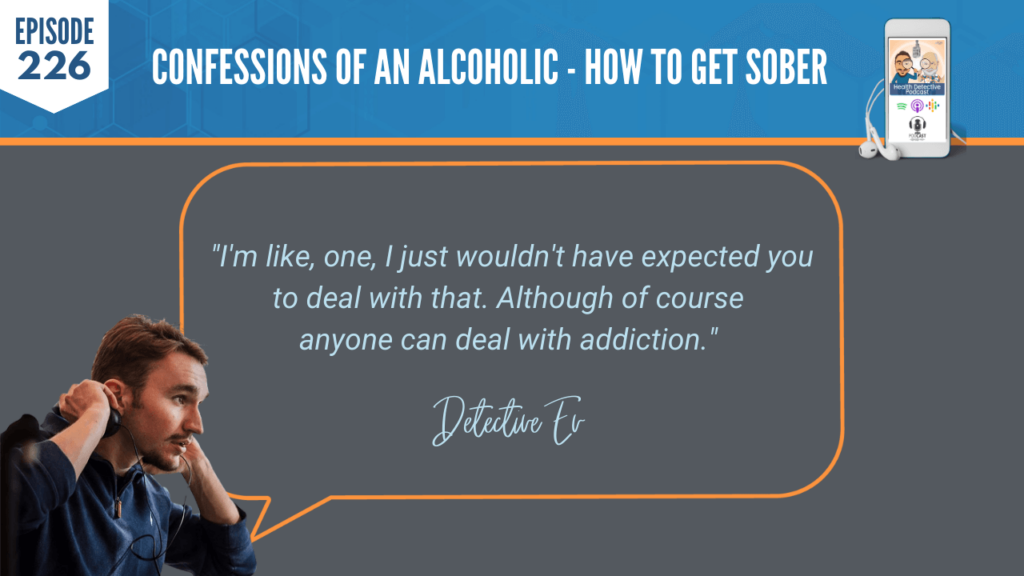
There are so many things going on here. I’m like, one, I just wouldn’t have expected you to deal with that. Although of course anyone can deal with addiction. But then two, you’re like on this other side now looking great, doing awesome. You’ve been through a lot.
Let’s just start with this. From my understanding, and this is the good news guys, from an audience perspective, I actually only have a surface level understanding right now of what Matt went through. But when I saw it, I’m like, we gotta put this on the show. So, what actually happened? This addiction stuff for you happened like fairly late in life. This is normally something that starts in people’s teenage years and for you it was a little later.
How to Get Sober: A Non-Functioning Alcoholic
[00:07:17] Matt Leonard: Yeah, absolutely. It’s funny, if you knew me in high school, I didn’t touch a drink or a drug until I was 17 years old. Not that I had, like, oh, it’s illegal, I shouldn’t do that. It was more of just like a moral issue with it where my parents wouldn’t like me doing this or something like that. I figured I’d have time to explore that later.
Eventually, my friends got me into it. I did a little bit of the partying and stuff when I became a senior in high school. But a lot of people that I meet when I go to meetings and stuff like that, like AA meetings, are like, dude, I was smoking crack when I was 14 years old. And like my dad was handing me beers when I was nine, stuff like that. It’s just crazy cause I don’t have the craziest story out there.

Luckily, I wasn’t homeless or anything like that. My window was very small for addiction, I would say. I started when I was like 17, 18, I got to college, kind of ramped it up from there. By 25, I was a full-fledged, like non-functioning alcoholic and ended up seeking treatment. It’s kind of crazy, just like that little five-to-six-year span is where it really spiraled.
[00:08:16] Detective Ev: We talk about these things kind of loosely. I mean, I know other generations certainly have done drugs in high school. But I go into these schools still to this day and I do genuinely believe that there is a trend now to be doing these things earlier on a mass level.
How to Get Sober: Normalizing Drug Use
It’s not just one or two fringe stories of the person smoking crack at 14. You’re hearing about some serious stuff in these schools. These kids, in very nice places, are doing promethazine or Xanax or whatever, and they can’t even drive a car, legally. So, when we’re doing this this early and they’re exposed to it this early, it messes up the brain. My point is, even in our school, actually, yes, starting at 17, 18 was somewhat late.
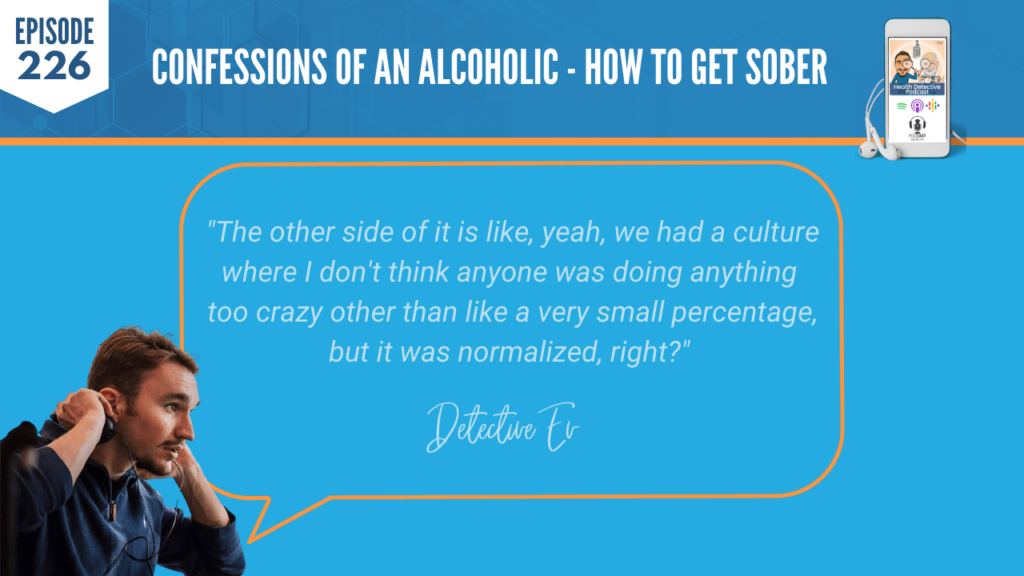
We had a very large graduating class, there’s like 450 to 500 people per graduating class. That alone could be a reason we never really interacted. You could go through high school and miss a name or two for sure. The other side of it is like, yeah, we had a culture where I don’t think anyone was doing anything too crazy other than like a very small percentage, but it was normalized, right?
Like we go to the football games or basketball games, and you know there’s kids drunk in the front row, screaming at the other team or whatever. Weed was a huge thing in our school. So, it was this moral aspect that kind of kept you from maybe doing that stuff.
But when you were doing the substances then, was there a mental health aspect to this initially or was it more just, hey, I’m experimenting, and it just got outta hand over time. Cause normally there is a mental health side to this sometimes.
How to Get Sober: Caving to Fit In
[00:09:36] Matt Leonard: Yeah. I think when I first started it wasn’t ever really a mental health thing. It was just kind of like, I’m excited. It almost came back to that trying to fit in concept.
I remember maybe when I was like a sophomore/junior and I still wasn’t really drinking, I wasn’t smoking pot, anything like that. Throughout high school for the most part I would come in on Monday morning and all my friends at the lunch table are sharing stories about how so-and-so got so drunk and did this and these two people hooked up. It was like, dude, I just felt so left out of that.

I think part of why I finally caved was just like, I want to see what this thing that everyone else is doing and why it seems so exciting. You know, I want to get invited to those parties. I felt like I wasn’t able to build the friendships with the people that I wanted to build because they were building them outside of these activities that I was taking part in. So, that’s kind of where that started.
I don’t want to jump ahead too much, but it definitely ended up being a coping mechanism later in my life to address some of those mental health problems that I kind of started to get into.
Detective Ev: You went to college, correct?
Matt Leonard: Yeah.
[00:10:36] Detective Ev: Okay. That’s one of the things for me. There was a variety of reasons, but I only went to community college a semester and a half, dropped out, did my own thing. For me personally, I’m thankful for that. Cause I wasn’t ready to handle college.
How to Get Sober: Finding Myself and Drinking More
I was doing a lot of the stuff that people were doing in college at 16, 17 years old. If I continued that even longer, I was kind of screwed.
Our audience, it’s not exclusive to this, but like 80% are between the ages of 35 and 44. We have a lot of women that listen, they have kids. So, they need to know what they’re kind of going up against here.
I don’t want people to be fearing college, that’s ridiculous. But how has the landscape ended up at these colleges? Because I feel like there used to be the party schools. Now I feel like I can go to any college campus, and I can get blacked out drunk all weekend and no one’s really there holding me accountable. In fact, I might look like the cool person for that. Is my interpretation of that wrong or is that kind of what the landscape has become at these colleges?
[00:11:27] Matt Leonard: No. Definitely where I went to, it wasn’t the party school, but it was a big party school. That’s kind of where my drinking definitely progressed. It went from like maybe I’ll drink once a month or something when there’s a party to, I’m going out like tequila Tuesday, Thursday, Friday, Saturday, maybe sometime Sunday, because you can.
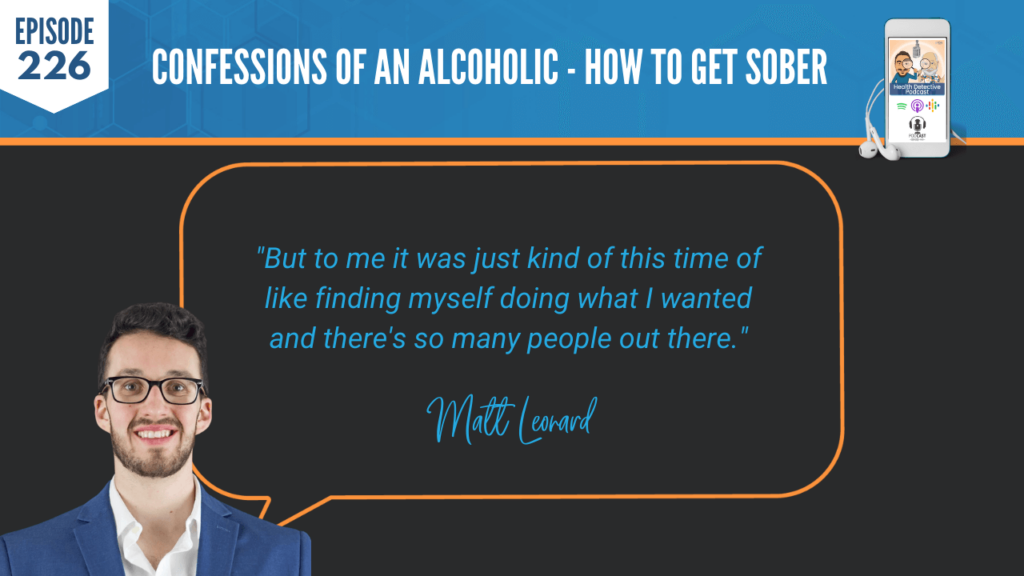
You know, it’s the first time you really get to experience life on your own terms without someone there telling you what to do. The schedule kind of caters to that where you can take later classes so you can get hungover, kind of wake up, work it off or whatever. But to me it was just kind of this time of like finding myself doing what I wanted and there’s so many people out there.
How to Get Sober: College Expectations
The funny thing is, I went into college hating fraternities and sororities. I thought they were the stupidest, most culty, cringey thing ever. By my second year there, my sophomore year, I ended up joining one just cause I wanted to keep partying.
I moved off campus and quickly realized within the first two weeks, I was like, wait, I’m not surrounded by all these connections anymore. I’m kind of out here on my own. So, literally, I just joined a fraternity so I could have somewhere to party on the weekends.

We used to joke. I would literally say this with my friends, you’re not an alcoholic until you graduate. Because you’re in college, you know, it’s what you’re expected to do. You’re expected to drink and get high and do all these things. I prioritized partying a lot.
I mean, I still graduated you know, like Dean’s list honors and stuff like that. But I definitely sacrificed taking some classes or doing things that I would’ve wanted to do just because I wanted to go get drunk with my buddies a lot of the times.
[00:12:58] Detective Ev: Yeah. So, there’s this whole culture out there. Actually, if we go back into the actual DSM, which for those that aren’t mental health people, it’s the diagnostic and statistical manual. It’s how they diagnose mental health conditions. There’s a distinct difference between substance use disorder and actual addiction. They are two separate things.
I know that you actually dealt with addiction, but what’s happened a lot at these colleges is, yeah, there’s this party plan, five-year party plan basically. You add the fifth year, cause it takes that long to get out sometimes. This is textbook substance use disorder.
How to Get Sober: Drinking Daily Three Months Straight
But maybe because the person can take a day off once every week, it wouldn’t classify in the normal sense of addiction. I don’t think people are educated enough on substance use disorder. I always looked at myself even in high school, I actually didn’t meet the criteria of a drug addict. I mean, this sounds so insane to talk about now, like it was normal.
My 16, 17-year-old brain rationalized, if I only take Xanax for a week and then take a week off and now, I just add alcohol in those days, then I’m not an addict. By definition, I am not. I really am not. But I didn’t see the insanity of what I was actually doing there, that I’m like swapping drugs out. Oh, and I don’t have any of that stuff tonight, so we’ll just take a bunch of Benadryl. It’s like, what on Earth was going through my head with that?
When we classify an actual addiction, we’re talking about withdrawal, we’re talking about daily need for this. So, when did this get to the point where you’re realizing that you have a problem with this?
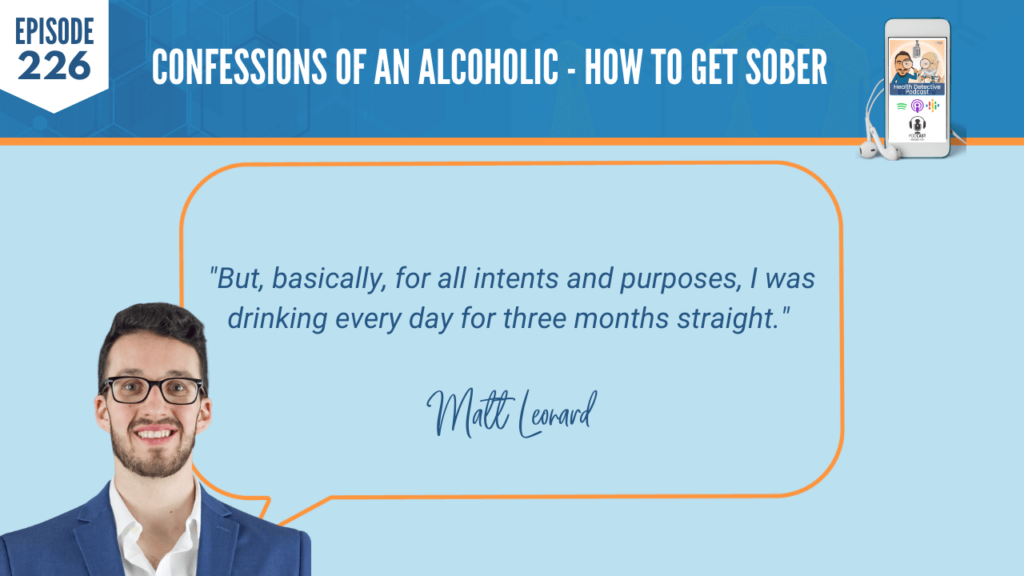
[00:14:23] Matt Leonard: Sure. So, just a little bit before that. Coming to the ends of college, my junior year, I went and studied abroad in Australia. That was the easiest course load I ever took. We’re there, it’s a big drinking city. So, I was drinking basically every day for three months, you know, maybe a day or two off here, or I’d end up getting sick and I’m like, I gotta stop drinking for a couple days. But, basically, for all intents and purposes, I was drinking every day for three months straight.
How to Get Sober: Drinking Prioritized Over Feelings
I came back and I think this is where it really shifts into the mental health aspect. I moved back home for the summer out for that semester to pursue an internship. I was living with my mom, so I really just stopped drinking. I ended up being like, yeah, I’ll go to the bar on Friday or Saturday, but during the week is the work week; I don’t drink stuff like this.
I started getting back into the gym. I was, gotta get my protein in and can’t do that if you’re drinking. Quickly after that I started getting severe anxiety, to the point where I didn’t want to socialize. You could be my best friend and I’m sitting in a room having a conversation with you and I’m nervous to talk to you, like I’m shaking a little bit. I just feel genuinely uncomfortable. That would happen all the time. It helped me back at work when I was dealing with clients at work, it helped me back socially.
Then it was like the weekend would come and I’d go out. I’m like, all right, I’m going to pre-game, get a couple shots of tequila in me, go to the bar. That’s when I would finally feel normal again. I pursued psychiatric help with that for like anxiety and depression. One of the first things they tried to do for me was put me on Lexapro. I think it was that and maybe an MAOI or something like that, where she was like, you can’t drink on this medication.
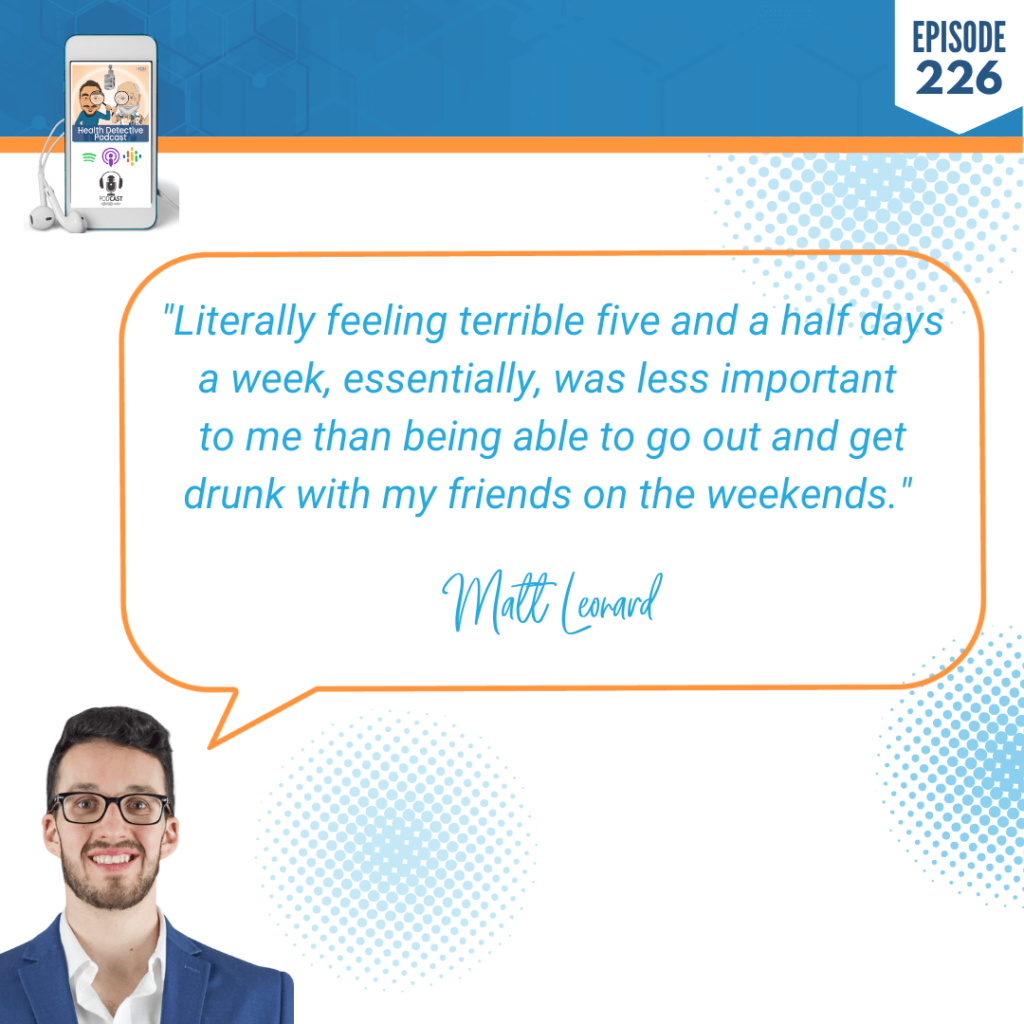
I was like, thanks. I’m good. Literally feeling terrible five and a half days a week, essentially, was less important to me than being able to go out and get drunk with my friends on the weekends.
How to Get Sober: An Unescapable Vicious Circle
So, I turned down the one medication she gave me. I found another medication that was like, we strongly suggest you don’t drink on this, but you can. I was like, I’ll go with that one.
That just exacerbated how quickly I’ll get drunk, how delirious I’d become when I was drunk. It created this weird chicken and the egg thing. Cause I didn’t realize this until I actually genuinely started to seek help a few years later for my drinking. Essentially what happened was I kind of almost kicked myself into a little bit of a withdrawal.
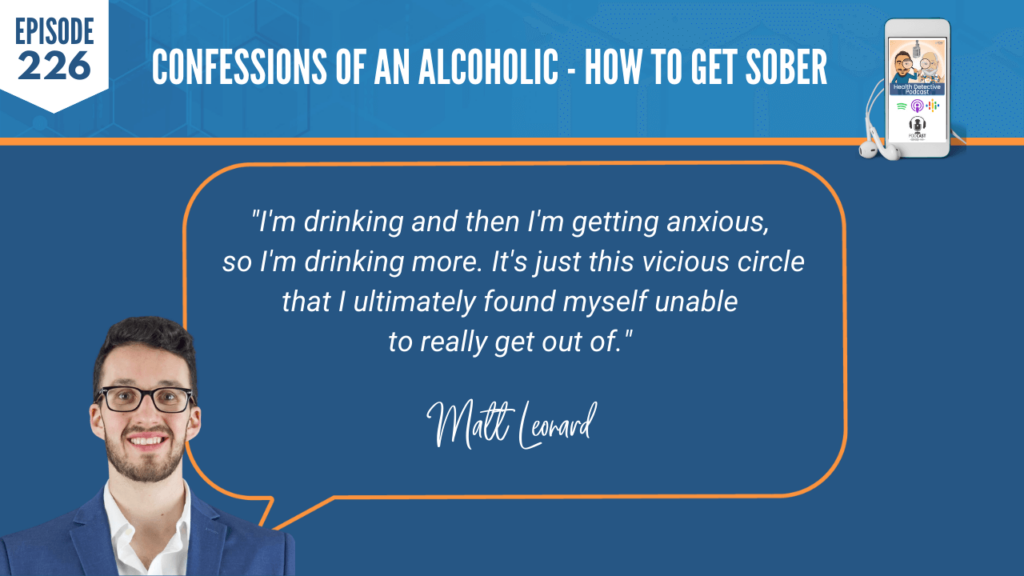
I had this crazy anxiety coming off of this insane period of drinking. I didn’t know how to cope with that anxiety until I figured out that I could drink to manage the anxiety. I’m drinking and then I’m getting anxious, so I’m drinking more. It’s just this vicious circle that I ultimately found myself unable to really get out of.
A couple years later it was just this like balancing act of, I need to be sober so I can perform my daily duties, but I need to drink to self-medicate. Ultimately, the drinking won that battle. I lost my job and was very close to not being able to pay my bills. Luckily, I had parents that were able to help me out until I finally accepted that I needed to get the help that I needed to get. It’s just crazy how quickly that can spiral.
[00:17:22] Detective Ev: I mean, even that thing with Australia, I can understand the perspective, I really can. Cause you’re going out somewhere fun. It’s like, I’m not going to do this again, maybe ever, let alone any time soon. So, you’re living it up, man. You’re having a good time.
How to Get Sober: Society Normalizes Alcohol
This was always something that bugged me. There’s a normalization of alcohol in our society, which somehow gets it into people’s heads. I’m not saying that this is you, I’m just speaking in general. It gets it into some people’s heads that this is not a big deal where most people don’t know that alcohol is one of the only drugs, in addition to the class of drugs called benzodiazepines, that the withdrawal itself can kill someone.
People say, oh, well, no, opiates can do that. No, it can’t. The seizures that the opiates cause can kill you, and it’s an indirect death. Opiate withdrawal cannot kill you. Benzodiazepines can and alcohol can because it’s the exact same mechanism. It’s something with GABA. This is not a joke.
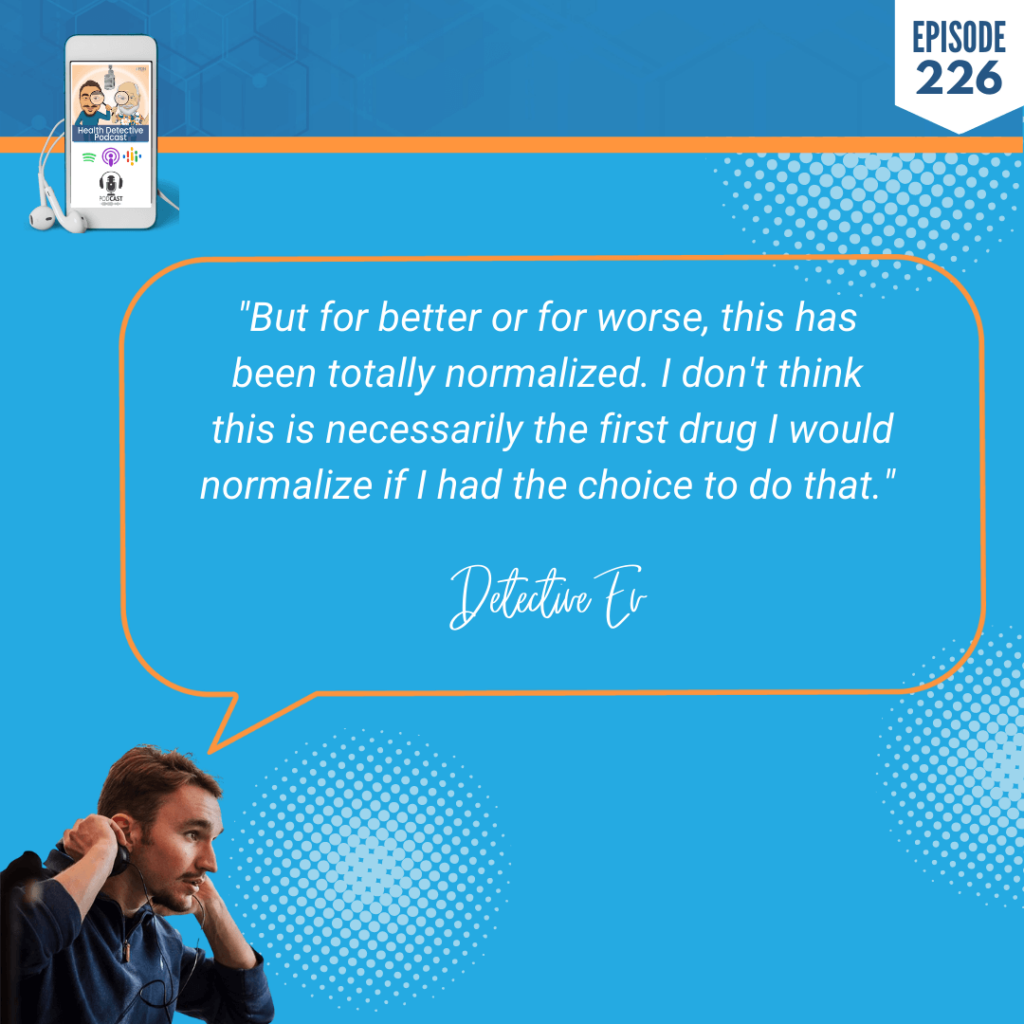
I know that I can go to the store right now and get it super cheap as a 27-year-old male. So, we think, well, how big of a deal can it be? Right? But for better or for worse, this has been totally normalized. I don’t think this is necessarily the first drug I would normalize if I had the choice to do that. I don’t know if I would necessarily normalize any of them at this point in my life, but that’s beside the point.
It’s easy enough to think like, all right, I’m young, I’m having fun right now. I’m in freaking Australia, this is cool. So, I’m just going to go do this stuff for three months and then, yeah, all of a sudden, I have a problem.
How to Get Sober: Unable to Admit the Drinking Problem
Now I’m not asking this next question to condemn you, because I had my things like I mentioned in high school with the Xanax for one week and then off for one week, where it seems logical at the time, then you realize looking back, that this was a diluted mindset.
You said three years later, almost, it was when you got some actual help. When you went in for this anxiety and then took the medication that would allow you to drink to some degree, were you even connecting yet that alcohol was a problem? Or was this just like, oh, okay, I still want to drink so I’m going to take this medication.
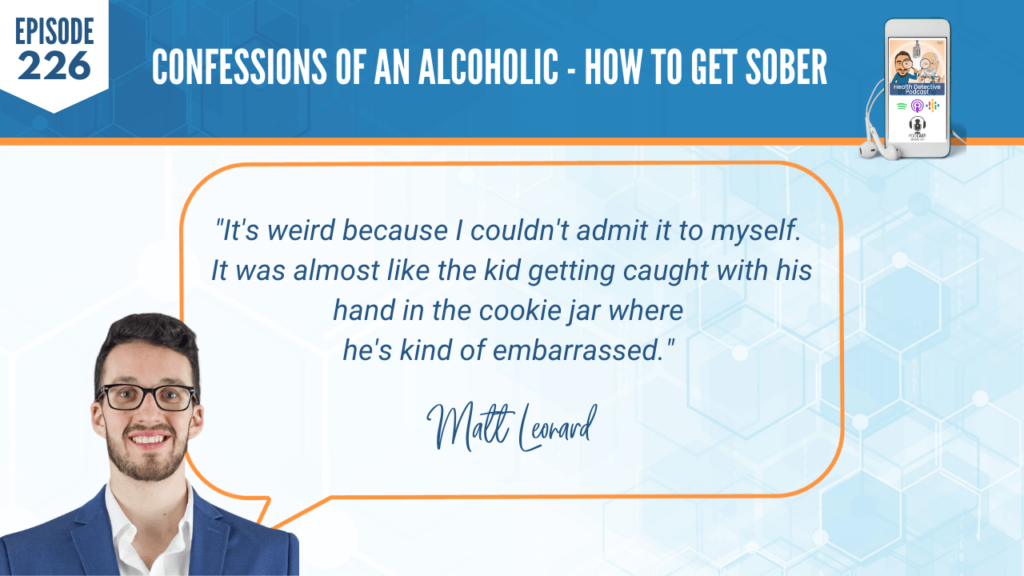
[00:19:07] Matt Leonard: It’s weird because I couldn’t admit it to myself. It was almost like the kid getting caught with his hand in the cookie jar where he’s kind of embarrassed. He knows what’s the problem, but he doesn’t at the same time.
I would go in and would talk to like a doctor, I went to several. They’re asking me like how much I drink. Immediately in my head I’m like, I probably drink more than I should, but I don’t have a problem. They won’t get it; they’re 40 years old, 50 years old. I’m 21, 22, 23, that’s what I’m supposed to do. I’m like, all right, whatever I think I drink, I’m going to cut that in half.
So, I say, I think I’m drinking, we’ll call it six drinks a day, probably 10 to 12 on the weekend, something like that, so over 50 drinks a week, I would say. I’m going to be like, I drink maybe 20 to 25 a week. She would look at me and say, that’s a lot, we should cut back on that.
How to Get Sober: Trying to Outsmart Alcohol
So, half of what I’m actually drinking is what I’m being told is a lot. It’s just this weird thing where it’s like you don’t want to listen to this authoritative person at such a young age and you can’t believe that you have a problem.
One of the things that I kind of gravitated to really quickly, is like the stigma against addiction. I think we’re getting a lot better at it as a society. But the things that kind of held me back from admitting that I had that problem was I didn’t think that I was the type of person that could have one. We were kind of talking about this before the show, which was, it could happen to anybody. It could happen to doctors, lawyers, it doesn’t matter where you’re from.
I was like, dude, I went to a good high school. Both my parents love me. They’re divorced, but they also love me. I have a good family around me and a lot of friends, a secondary education in the form of college, a good job at the time, and I’m smart.
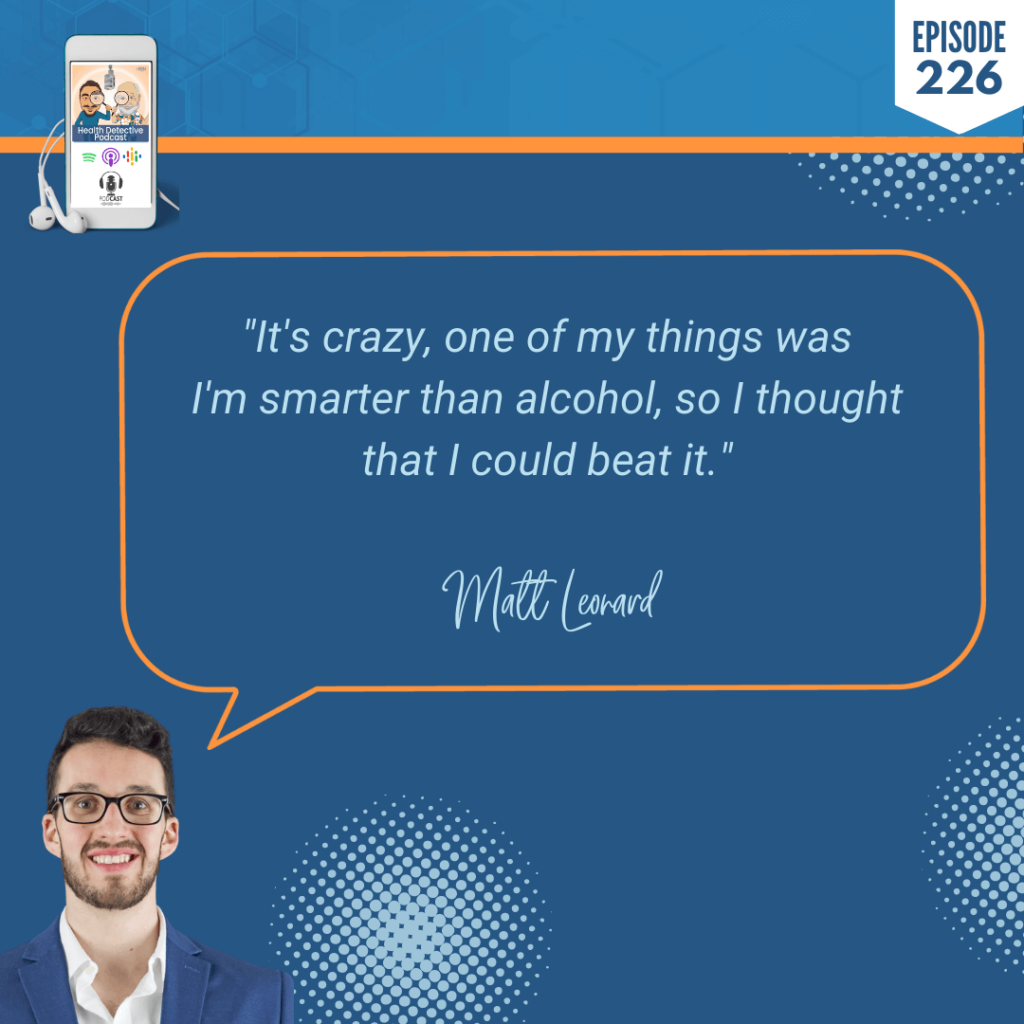
It’s crazy, one of my things was I’m smarter than alcohol, so I thought that I could beat it. Because to me, if I admitted that alcohol was stronger than me, then I was a loser, I was a failure, I was weak-minded. I thought that I had to be able to come up with a way that I could successfully drink. Whether that was switching to beer from hard liquor, or we’re going to take the week off and only drink on the weekends, or we’re going to do this or we’re going to do that.
How to Get Sober: Gratefulness
We’re only going to drink when we’re with people, not when I’m by myself, that failed every time. Every single time it led to me being back by myself, drinking in my room till I was blackout drunk, and then waking up in the middle of the night. The first thing I would reach for was that beer can or that liquor bottle just so I can get something back in me.
Covid, the quarantine, really just perpetuated this. When I first got sober, I was like, I wouldn’t be here if it wasn’t for Covid. Covid made me an alcoholic. I don’t want to say I’m grateful for Covid because that gets into a whole nother thing, but I’m grateful for what I took from Covid. Because even though it kind of destroyed a year of my life, I think it just brought it to the forefront in a really rapid way.
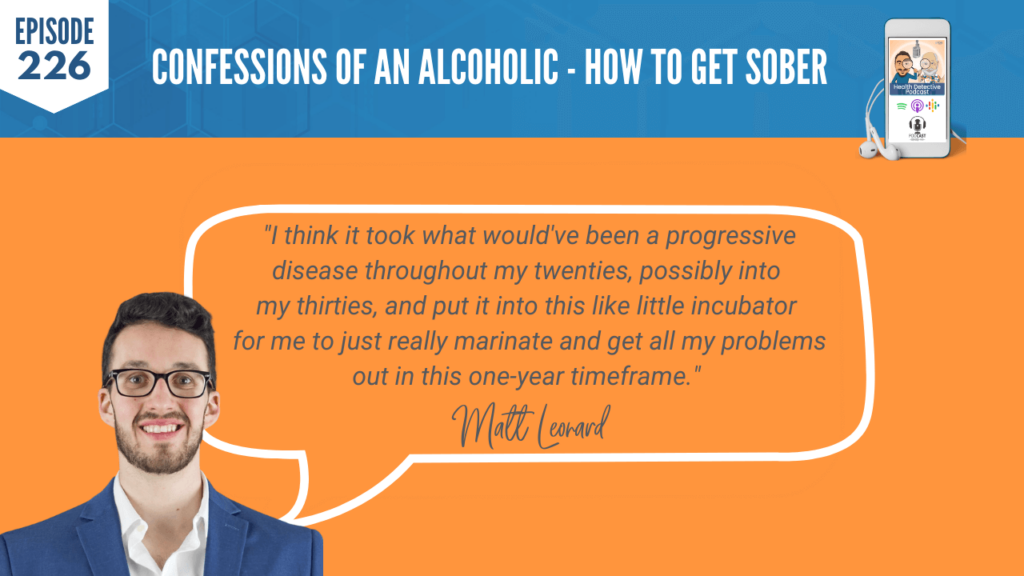
I think it took what would’ve been a progressive disease throughout my twenties, possibly into my thirties, and put it into this like little incubator for me to just really marinate and get all my problems out in this one-year timeframe. I think it probably saved me from wasting the next 10 years of my life battling a disease that I was kind of able to cut short.
[00:22:19] Detective Ev: That’s actually a good part about this.
By the way, on a side note, I completely respect the realness of this. I know that this is still a relatively new thing for you. But this is what works on this show and other shows, just people being honest. Since you don’t have that stereotypical thing that society puts out of like addiction or whatever, it makes people realize, oh, this does happen.
How to Get Sober: The Prevalence Among All Groups
I always say, we have the stereotypical things that you see in movies or on the news for addiction or other things. I’m like, no, the other people are just better at hiding it. The prevalence is still there amongst all groups.
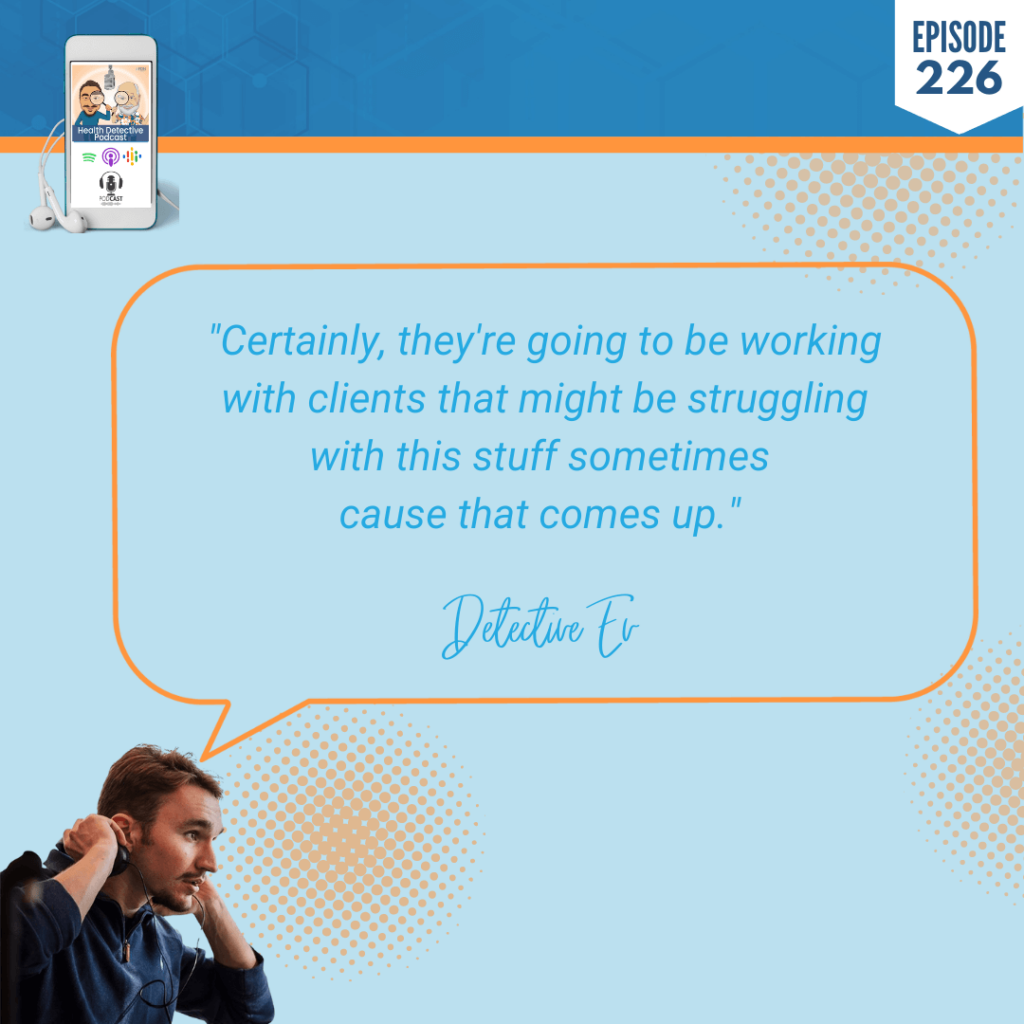
Even if I want to believe that the people in the functional health world are somehow immune to this, I know that that’s just, again, my own ignorance, promoting the stigma. There is someone that listens to our show right now that is dealing with addiction. They might call themselves a functional health practitioner, seem as healthy as can be, and they’re struggling and need to hear this. Certainly, they’re going to be working with clients that might be struggling with this stuff sometimes cause that comes up.
I’m not glad that you experienced it, but I’m glad overall that it did put it into this incubator as you described, progressed it a little more rapidly while still keeping you safe enough to be here today. Because then, yeah, you waste a really significant year of your life, but then you don’t kind of like half waste the other 10 years. I think we all have those moments if we’ve abused substances or been addicted to them.
I remember when I was on probation using drugs still, and I was on house arrest at one point using drugs still. I just sat there because I had a terrible night with my high school girlfriend the night before, I was just such a jerk to her. I sat there in my bed in the morning, I’m like, what is the plan? You’re on probation using fairly hard drugs like benzodiazepines, you’re going to die or you’re going to go to jail.
How to Get Sober: Thinking 10 Minutes Ahead
I think sometimes we need the more extreme situations like it sounds you went through to have those moments where we’re like what is going on here? I can’t ignore this anymore. It’s just so in your face that you kind of have to accept that you have a problem.
I want to go back a second because I appreciate also what you said about being in the doctor’s office. You kind of knew that you had an issue, but we’re putting it on the back burner because this is something that needs to be called out for people.
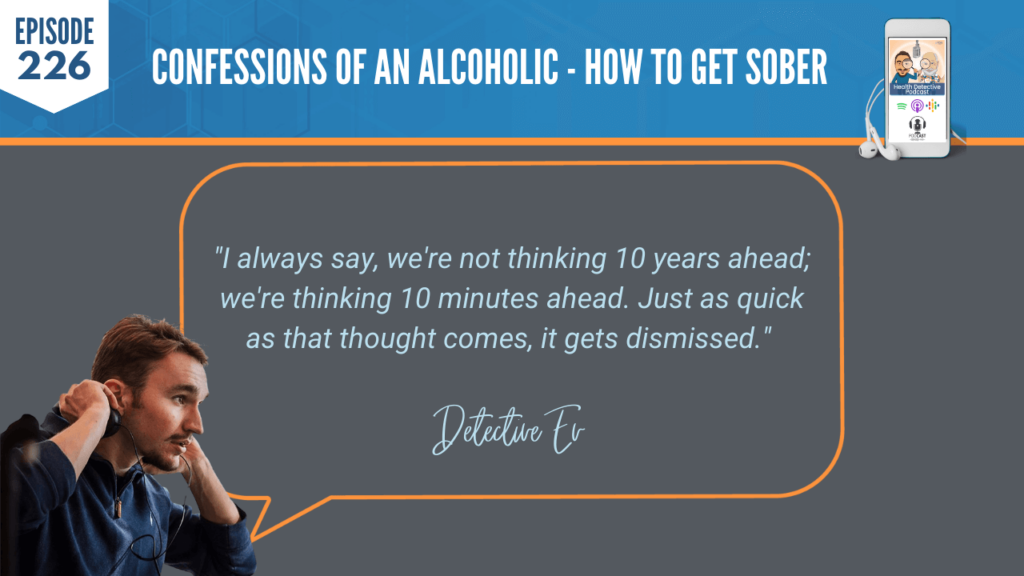
If you asked Evan Transue at 17 years old, hey, do you think it’s a smart idea to be taking Xanax for one week and then not again the next week? I would’ve said, no. But we’re in our own heads, and when we’re abusing substances. I always say, we’re not thinking 10 years ahead; we’re thinking 10 minutes ahead. Just as quick as that thought comes, it gets dismissed.
We sometimes, not always, but sometimes need a third party to come in and say, do you think that’s okay? It seems so simple, but that can be the power of psychotherapy, they do a lot of stuff. But sometimes that can just be the power of having someone looking in front of us and saying, do you think that’s smart, Matt? Or, hey, that’s a lot. And you know, in the back of your head that you’re lying about the amount by 50%. Right? That’s crazy.
[00:24:59] Matt Leonard: Yeah. At some points in your life, you’re just not ready to hear things. Both of us were so young.
How to Get Sober: Covering Tracks to Hide a Problem
It’s funny because if you wrote out everything that you were doing on a piece of paper and put it in an envelope, then someone gave it to you and said, look at this person and see what they’re doing. Does this seem like a healthy lifestyle, whether they’re abusing Xanax or like I was going through almost a case of beer a day? It’s funny, like I didn’t think I had this problem.
Yet, I couldn’t go to the same beer store that I went to on Monday because I thought the little Mexican lady might recognize me and I had just bought a case of beer. So, I was like, I have to go to this store, so they don’t connect the dots and think that like, why are you drinking so much? You just bought 30 beers yesterday.
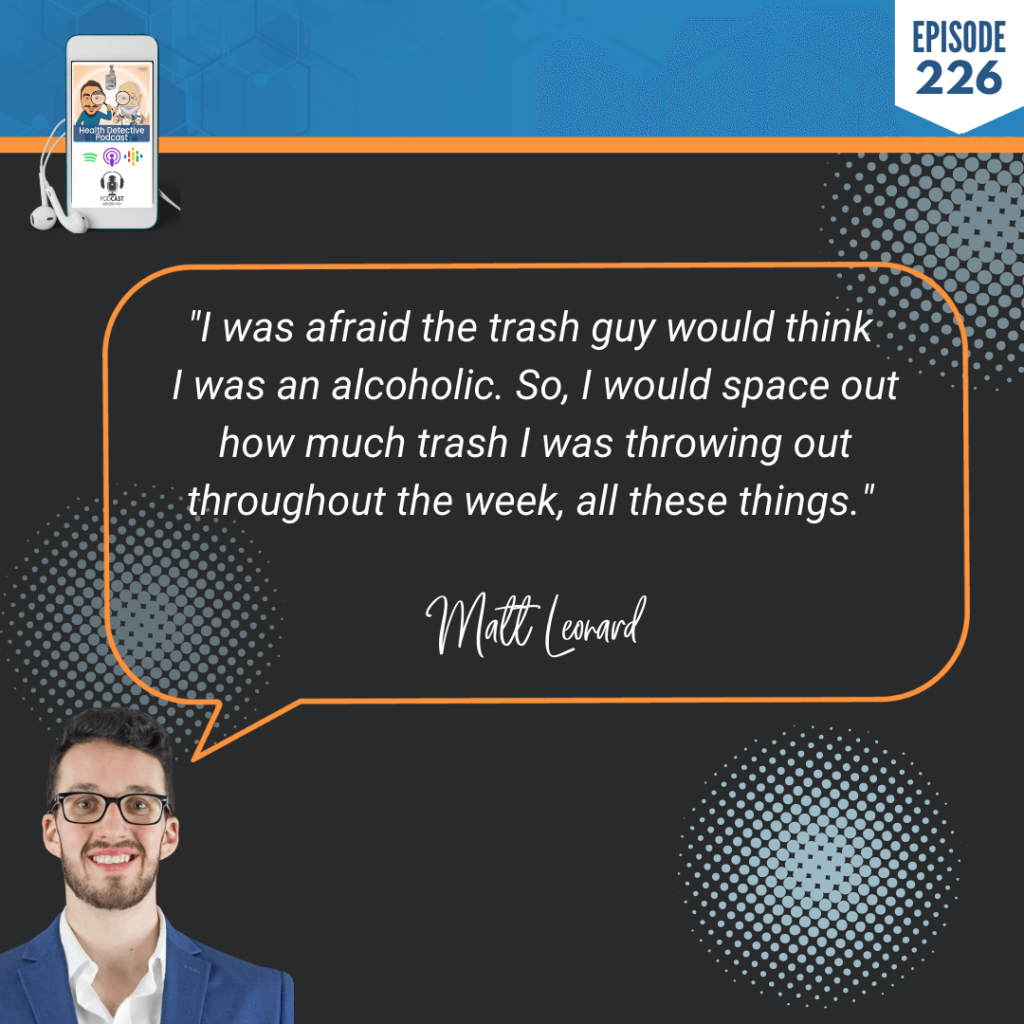
I was afraid the trash guy would think I was an alcoholic. So, I would space out how much trash I was throwing out throughout the week, all these things. But I still can’t just fundamentally admit to myself that I have a problem, even though I know what I’m doing is insane.
[00:25:52] Detective Ev: I think what happens is, again, it’s that whole 10 minutes versus 10 years mentality. I don’t want to say we lose our self-awareness, that would almost make it seem justified or excusable.
But that is kind of the experience that I had. It sounds very similar to what you’re saying. It’s like your self-awareness is a little foggy, I’ll put it that way. Because again, if someone were to come to you and ask these questions, I think any reasonable person, even if they lied to their face, would still instantly know, okay, no, this is bad.
How to Get Sober: Depressed, Lonely, and Isolated
But when you are focused on the substance and the substance alone; that’s it. It’s like, how do I get this? What do I need to do to get it? How do I get more of it? How do I get away with using it so other people don’t know? How am I hiding from the woman that might see me buy another case of beer today? You don’t even have time sometimes to think about, oh wait, this is just bad. Right? I have a problem; I have an issue here.
I think we kind of got to it. I don’t know if there’s anything more that we need to elaborate on. We talked about it from a general perspective, so forgive me if I missed it, but I feel like there’s probably a more specific moment where you realized like, okay, like crap, something’s gone wrong here sometime during the pandemic. So, was there a more specific moment where you’re like, yeah, this needs to stop, or what happened?
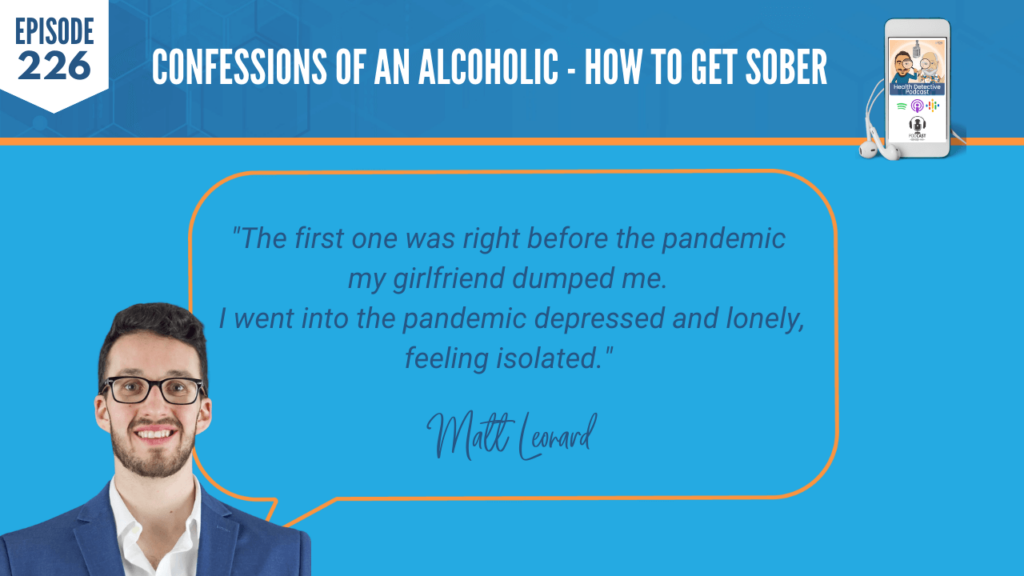
[00:26:56] Matt Leonard: There’s a couple events in my mind that I kind of remember significantly. The first one was right before the pandemic my girlfriend dumped me. I went into the pandemic depressed and lonely, feeling isolated. All those things that everyone felt during that period of time, that only really gave me an excuse to drink more and more. So, I just kept escalating.
I got put on notice from my job. So, I cleaned up my act for a couple weeks. Then I was like, nah, I’m good and went right back to drinking again, missing work, stuff like that. Obviously, I got fired and then sometime right before Christmas I just felt absolutely miserable.
How to Get Sober: Suicidal Ideations
I know you’ve dealt with mental health struggles. I can’t remember if you’ve ever contemplated the suicide nature of things before. I’m not sure if I was serious or if I just wanted attention, but I reached out to my ex-girlfriend. I basically told her, I can’t do this anymore, I want to kill myself. I don’t know if I genuinely felt like I wanted that or just wanted someone to see me.
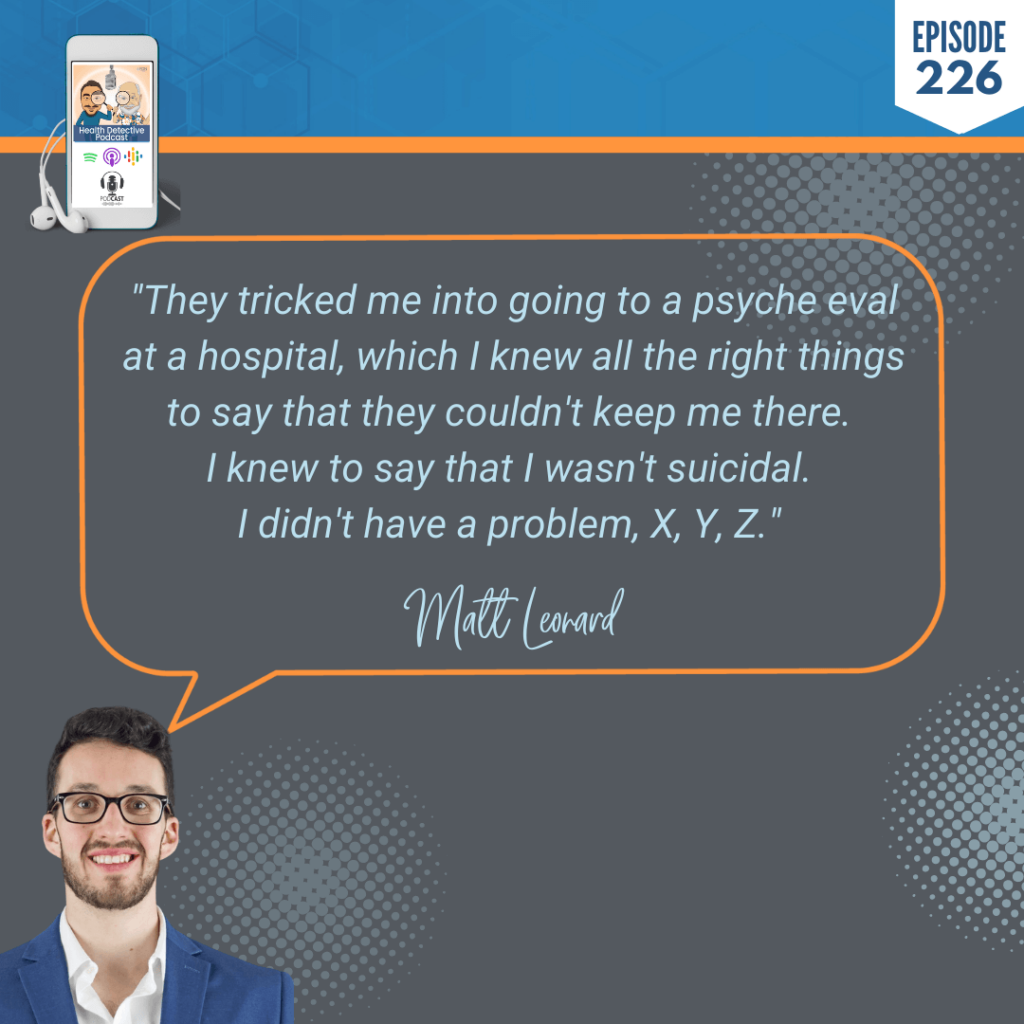
She reached out to my parents, which I got mad at her for doing. But you know what normal human wouldn’t do that. I’m grateful for that. So, my sister paid me a visit. They tricked me into going to a psyche eval at a hospital, which I knew all the right things to say that they couldn’t keep me there. I knew to say that I wasn’t suicidal. I didn’t have a problem, X, Y, Z. So, they’re like, all right, you’re free to go; you’re discharged.
I went home. My mom still didn’t really know exactly what I was doing, but I think they were slowly starting to put the pieces together of like why I had just been such an absent person over the last couple years, why I always looked terrible every time they saw me, stuff like that.
My mom got me home and she said, I think you need to stop drinking. I was like, for the rest of the week? She’s like, no, forever. I literally said, you’re high. I thought that was insane. To anyone going through stuff, just the idea that you have to quit forever is such a daunting idea. You know? It’s like, I’ll quit today, but I don’t know what next week looks like or next year.
How to Get Sober: A Drinking Celebration for Being Sober
It’s funny when you get to rehab and everyone says the same things that you always think, which is how you know you’re in the right place. Mine was like, I can quit for now, but like what happens when I get married? I can’t have a glass of champagne at my wedding? I’ve heard five other people say that since I’ve thought that.
It’s just how crazy an idea is that? It’s like, you’re telling me I’d be getting married, I’m living this awesome life with this woman that I love, and my biggest concern is that I can’t have a glass of champagne at my own wedding? It’s crazy the delusions that you tell yourself.
But I quit drinking right around when my mom said that. That was like the beginning of January. I was able to put it down. I kind of stayed with them for a couple weeks and then I went back, started living at my own place in Philadelphia again. I remember I was kind of going in and out, in and out. I took a week on and then I’d sober up a little bit.
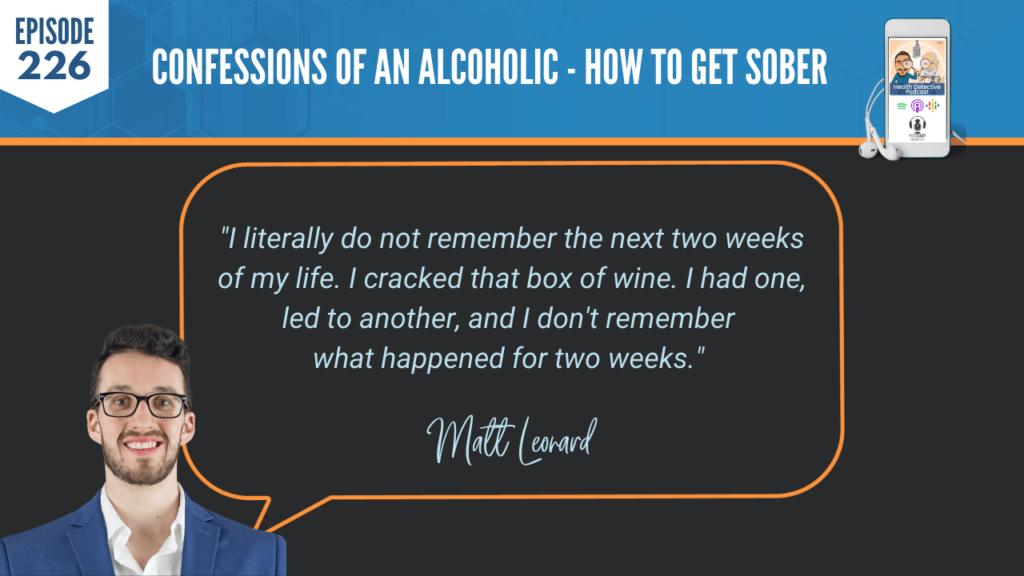
I wrote a journal entry, like, I took five days off drinking. I was like, I feel so much healthier. I feel better, I feel clearheaded, blah, blah, blah. That was on a Friday. I said, all right, I’m going to get a box of wine and I’m going to drink one glass as like a reward to myself for being able to stay sober for this week. Like, I deserve it, it’s Friday. I literally do not remember the next two weeks of my life. I cracked that box of wine. I had one, led to another, and I don’t remember what happened for two weeks.
How to Get Sober: Finally Asking for Help
Turns out I was avoiding my family, blew it off, blah, blah, blah. I finally got a phone call from my mom. She said, I’m really worried about you. I don’t know what’s going on with you, but I need to come see you. I don’t even really remember this conversation. I think I was probably like half drunk, half whatever.

She told me later cause I thought she was the one that dragged my butt to rehab, but I was actually the one that said I need help. I think I was just at such a low rock bottom, and I was tired of just lying to everyone around me that I just said, I need help. I can’t stop drinking. I don’t know what I’m doing. I’ve tried everything and it’s not working.
Both my parents are amazing people. They quickly found a rehab to take me to. They came down. It’s funny, I’ve heard people say your last pain point; it’s when my parents walked into my house and they walked into my room, who, I had a roommate by the way, who had no idea I was an alcoholic.
That’s how good at hiding this I was overall. I would go to the store; I’d immediately just run right into my room and put the beer in my room. I would take the trash out when he was sleeping, stuff like that. Cause I couldn’t let other people know what was going on.
This kid who’s one of my best friends, you actually know him. His name’s Charles. He’s one of my best friends since high school. He had no idea what was going on with me.
How to Get Sober: Surrender
My parents walked into my room and saw what an absolute dumpster fire of a war zone my room was, beer cans everywhere, just a disaster. My mom broke down crying and my dad gave me like one of the most disappointed looks he’s ever given me in my life where he is just like, where did I go wrong? It’s like, how did I fail this person? Like, what are you doing with your life?
That was really just the last thing that I was like, I can’t do this anymore. I can’t do this to the people that I love. That’s really what kicked me off. The whole journey just kind of escalated from there. I still didn’t think I was going to want to be or get sober or stay sober, but I just kind of kept doing what people told me to do.
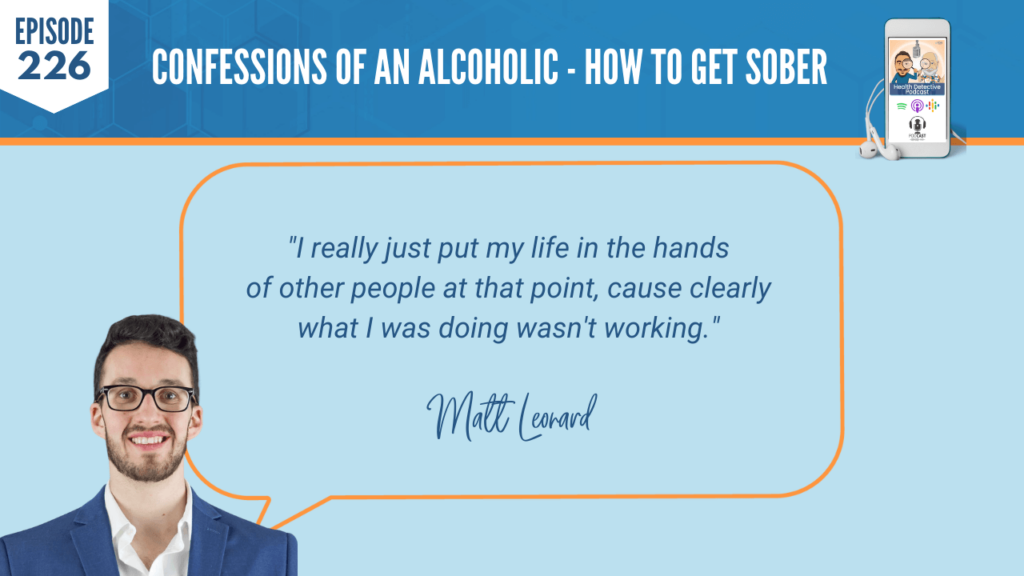
I’m not a religious person, but they talk about higher power and stuff. I really just put my life in the hands of other people at that point, cause clearly what I was doing wasn’t working.
[00:32:17] Detective Ev: Yeah, fair enough. Ironically, I’ve moved more religious as I’ve gotten older, but it doesn’t matter. This idea of giving to something else makes sense. Because yeah, we come to these realization points I think anyone that uses stuff where it was like what I was talking about before. My plan is not working. Like objectively speaking, this is failing miserably.
So, at some point we gotta give this up to someone else. Now I still need to take responsibility. I’m the one who takes the actions, but I need some insight elsewhere.
How to Get Sober: It’s a Cry for Help
I’m not a mental health professional in the traditional sense, right? I’m just a speaker and stuff. But one thing that you mentioned was this idea of maybe you were just seeking attention when you talked about the suicidal aspect. To me, that doesn’t matter. Even if you were, the point is the attention is not narcissistic attention seeking.

It’s attention to like indirectly or directly say, hey, I need help. I need to be seen in that way. So, for whatever that’s worth to you because I feel like that’s what my suicidal ideations were at the time. I don’t know that I ever was like, okay, I’m going to go do this. But I didn’t know how else to express how much pain I was in, especially as a man. I don’t think it was a thought process. But if I say this, everyone will know this is serious and we can kind of hopefully do something about this. You’re kind of waiting for someone to come and save you in a sense.
One thing I gotta touch on, Matt, because you talked about a few things here. There was this absent side to you in your family life. But you also even said you were really good at hiding this. So, I don’t know what the answer is here. But I look at alcohol, I’m like, that’s a heck of a drug man.
One, it smells. The person is going to, literally, sweat alcohol out of their pores at a certain point. So, you can smell it on their sweat. Certainly, you can smell it on their breath. Then you would think just by the behavior, despite how much of a tolerance you might build, you’d think that you’d notice someone drunk.
How to Get Sober: Warning Signs of an Alcoholic
I don’t know too many people who have struggled with solely alcohol, but is there any advice out there to people that might believe someone else in their life is addicted? Like, what would’ve been some of the warning signs, if you have any, other than just maybe being absent from the family?
[00:34:18] Matt Leonard: I’m trying to think in terms of warning signs. Obviously, if the person is like visibly drunk and visibly drunk often, that might be a warning sign. But outside of that, like I knew that if I had to drive an hour to go see my mom, obviously I had to sober up. There was a lot of times that I couldn’t.
I would say I gotta go see my mom at five o’clock, so I need my last beer to be at 12. I can sober up for three hours enough to drive and blah, blah, blah. Then all of a sudden, I can have one more beer at one o’clock. Then I finish that beer, all right, 1:45, let’s have another one. By the time, it’s the time I was supposed to leave, I have to admit like, I can’t do this. Then I’m shooting her a text saying, hey, I’m so sorry I got a flat tire.
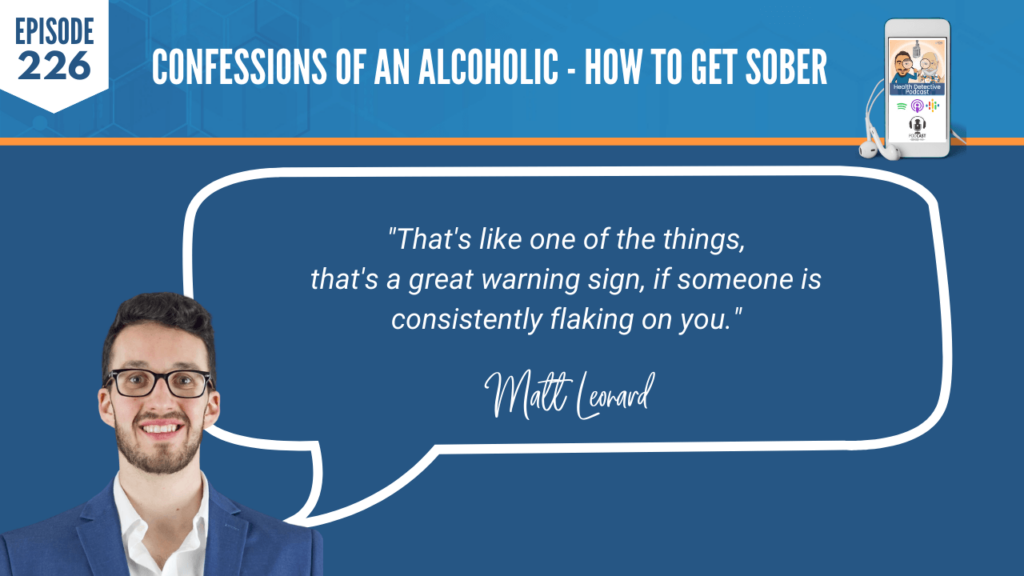
I came up with every excuse in the book. It was snowing. I got a flat tire. You know, I got called into work, like whatever it was. That’s like one of the things, that’s a great warning sign, if someone is consistently flaking on you. You make these plans, and they just don’t show up and they don’t really have a valid reason.
How to Get Sober: Gaining or Losing Weight
If you’re ever at work and there’s that one person that’s like always calling in sick or they had three relatives die this month, or something like that, you’re kind of like, what is going on with this person, dude? Clearly, they don’t want to be here. More than likely, they just genuinely don’t want to be there. But there is the chance that they just can’t show up for whatever reason cause they’re struggling with something.
For me it was like, I’m not sober enough to drive. Or even if I thought I could drive or whatever, someone could come pick me up, I’d be like, no, I’m way too wasted to be functional right now. So, I had to really pick and choose my battles of where I could be.
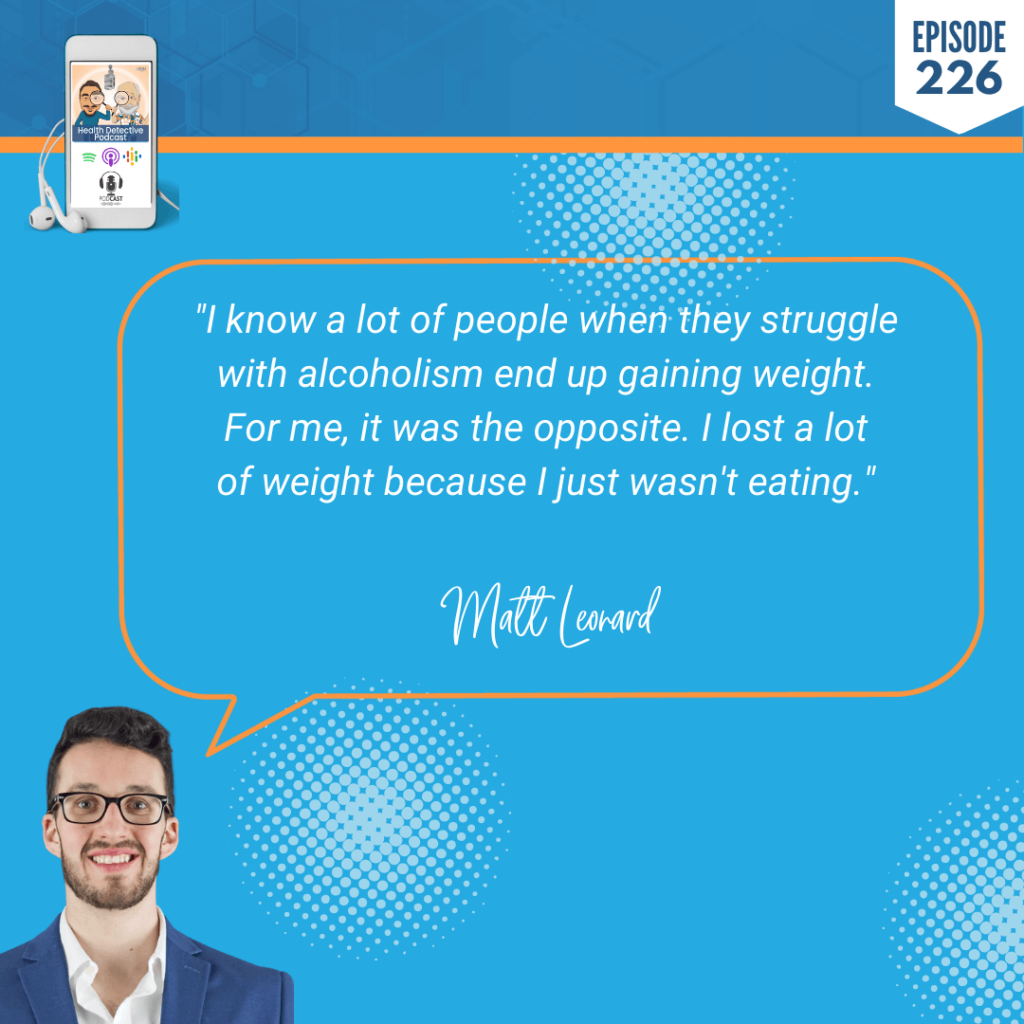
But in the event that I did show up sober, I was probably shaking, visibly anxious, and obviously didn’t look great or well maintained. I know a lot of people when they struggle with alcoholism end up gaining weight. For me, it was the opposite. I lost a lot of weight because I just wasn’t eating.
I would go anywhere from a day to, I think the most I ever hit was like probably four or five days, a couple of times, like literally just not eating. All my caloric intake was coming from alcohol. It started as laziness or me just like drinking until I wasn’t hungry anymore. Then by like the last couple of days, I might try to eat something and the most bland thing, like a piece of bread or like ramen noodles, were repulsive to me. The idea of putting something in my stomach was nauseating because my entire digestive system was just screwed at that point.
How to Get Sober: Stereotypes and Expectations
So, there are warning signs, like whether they’re drunk or whether they’re sober. I guess it obviously depends on the drug too. Like if they’re doing something maybe like cocaine, are they always sneaking away to the bathroom or something like that? But there’s definitely warning signs for everything. I showed all of them. I think the people around me just didn’t know.
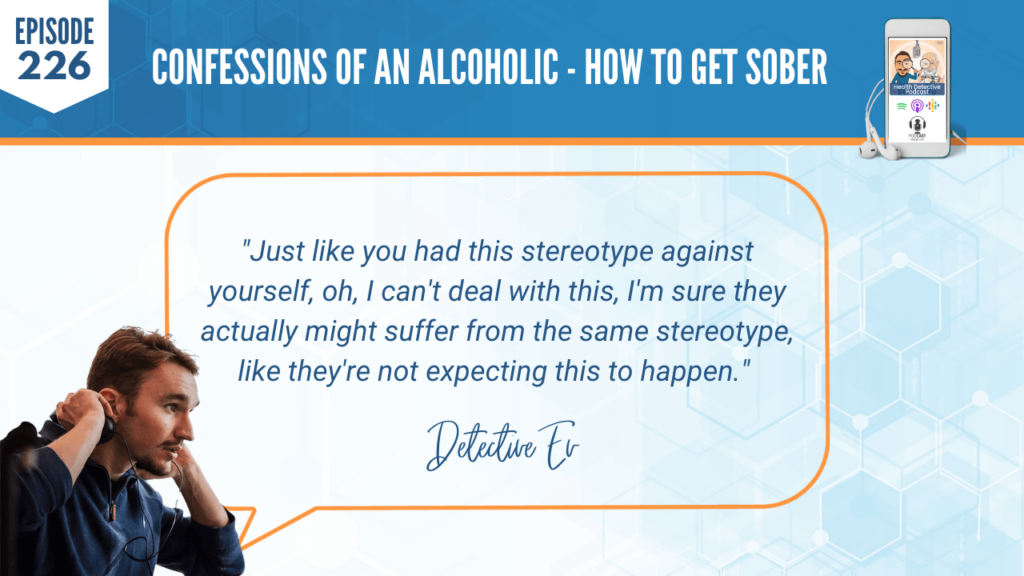
[00:36:54] Detective Ev: Yeah. There’s an expectation factor, right? Just like you had this stereotype against yourself, oh, I can’t deal with this, I’m sure they actually might suffer from the same stereotype, like they’re not expecting this to happen. I know it shocked me, right?
We didn’t know each other that well, but I was just surprised to see that. I’m like Okay. Like, I just saw this guy a few years ago. Technically speaking, I guess, that was September 2019. So, you were probably struggling with this to some degree at that point, right?
[00:37:19] Matt Leonard: I don’t know the exact timeline. It was probably in a phase where I was just partying a lot, but I was able to kind of go out and be that functional person. But on the weekends, it was my priority. You know, I ended up moving to Philly. Yeah, actually that’s right around the time I moved to Philly.
I was dealing with kind of, I don’t want to say abusive, but just like a toxic relationship at that time, like very emotionally draining. I think that gave me an excuse to want to drink. Then we broke up and that gave me an excuse, I want to drink even more. But yeah, just kind of a theme of my life has always been kind of that independence is not good for me all the time.
How to Get Sober: A Full Residential Rehab
It’s like I went to college, I started drinking more; I came back, lived at home, I stopped drinking as much. I got my own place, I started drinking more, all these things. It’s just like if you leave me alone, I’ll find a way to screw it up.
[00:38:06] Detective Ev: It sounds like the treatment side of things went fairly well once you were willing to commit to a real program there. For those that might be listening and actively dealing with this, and they’re intimidated by this, what did that look like? I think you went to an actual facility, you said, right? How did that go?
[00:38:24] Matt Leonard: Yeah, so I did 30 days in like a full residential rehab. I did I think like five days of detox. Luckily, my detox wasn’t too bad. There are people who get it really bad. Especially, I have friends that are heroin or Fentanyl users, they were detoxing for three out of the four weeks that they were there. Luckily with me, it maybe took two or three days to fully be detoxed and then another week for me to kind of feel like a normal, like I have energy, kind of person again.
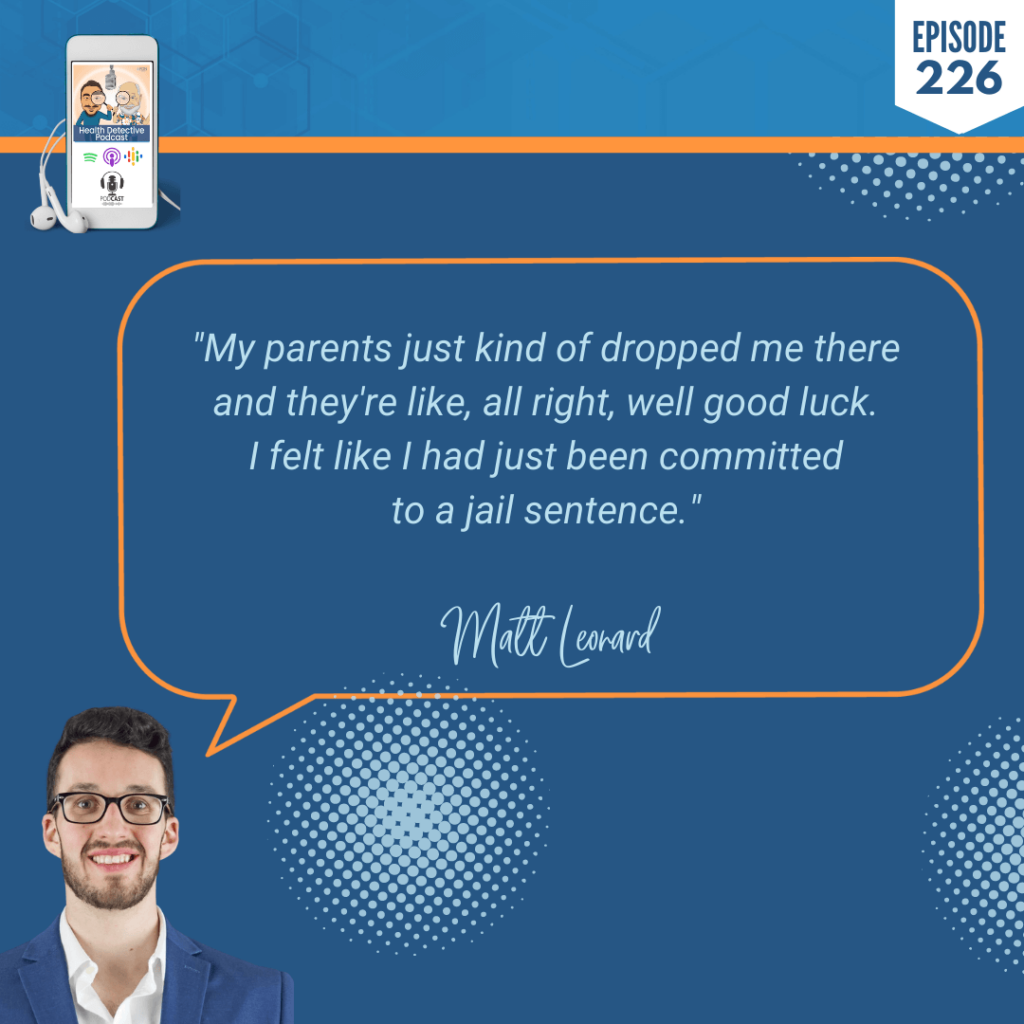
My first night there, I got there in the middle of the night. I think I got checked in and everything at like midnight. They put me in a room with some dude who was passed out for a week straight coming off meth. I almost had a panic attack my first night there cause it was up north around like the Pocono area. My parents just kind of dropped me there and they’re like, all right, well good luck. I felt like I had just been committed to a jail sentence.
How to Get Sober: Sticking With It
Obviously, I could walk out the door at any time, but I wanted to be there. I just felt so scared and so alone at that point, even though I was surrounded by some people. After that it took me a few days to kind of get in the swing of things.
Then I just decided I was going to embrace the program. I started making friends there. I’ve always been kind of one that’s like, I’m shy to warm up at first, but once I get going, I’ll talk a lot. By the end of my stay there, I was kind of becoming a leader in the community, stuff like that.
Then my parents wanted me to go to extended care. I was like, no, I just did 30 days. I’m cured. I’m fine. Still, in the back of my mind, like I’ll go home, and I’ll probably drink in like three months or something like that. This is kind of like where I said, just putting my life in the hands of other people. I was like, I’ll go do the extended care.
So, I went down to another place. I told them I would do two weeks in like a partial hospitalization like housing program. Two weeks went by super-fast. I was like, eh, I’ll do the month. I did the month, turned into six weeks. Then I stepped down to an IOP program, which is like an outpatient program where I’m living in their housing three times a week. I did two months of that. I did the general outpatient, which was like two times a week for a couple more months.
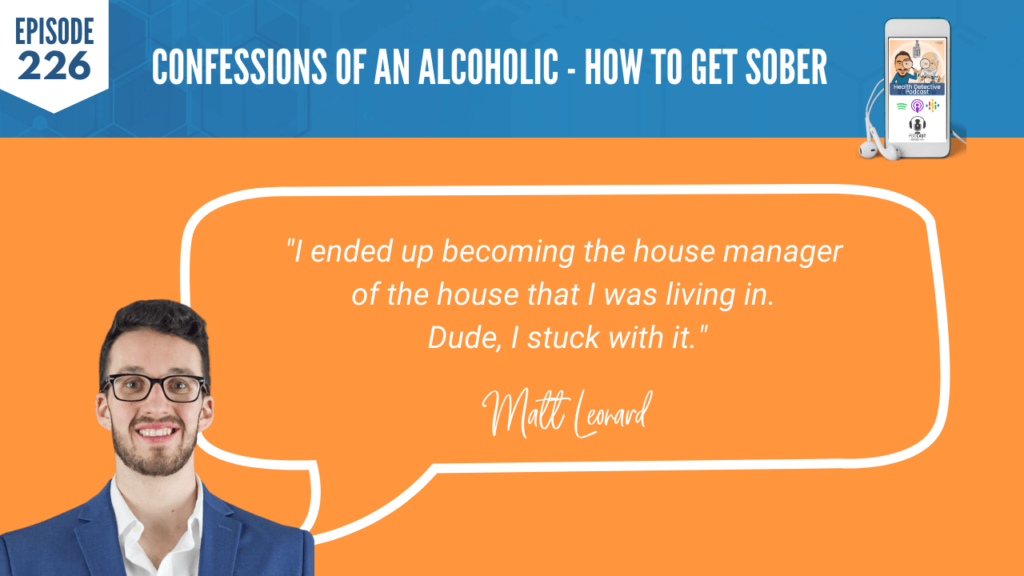
I ended up becoming the house manager of the house that I was living in. Dude, I stuck with it.
How to Get Sober: Get You Sober & Start the Ball Rolling
Now part-time on the side might actually end up turning into full-time. I’m working at the treatment center that I went to. It’s just this crazy thing where it’s like, I never thought that I would be here. I just kind of kept going with the punches, I just kept doing what people told me to do, even though I didn’t want to do it.
Eventually I was like, I actually kind of like it here, dude. It really wasn’t that scary once I kind of just embraced the program. I have no doubt that had I not continued past the 30 days in rehab, I wouldn’t be sober at all.
[00:40:53] Detective Ev: That matters. Because statistically speaking, and I don’t mean to discourage anyone, you know, keep trying different things, but statistically speaking, it is less probable than not that someone will not stay sober after those 30 days. I was about to ask you and you beat me to it. Like, did you feel that staying for a long period of time in these different facilities, but still, nonetheless, you stayed. That ended up being a huge aspect for you.
So yeah, I always felt like, especially for some people, like you’re talking about individuals that again, might have been doing crack and stuff in ninth grade, or nine years old, whatever it was. How on earth are you supposed to just fix things in 30 days? I mean, that just seems unrealistic to me. I don’t even think your brain’s rewired by then.

[00:41:34] Matt Leonard: That’s the thing, is like rehab, I believe, is meant to get you sober and kind of start the ball rolling on staying sober.
How to Get Sober: Teaching You to Live Sober
But the extended care, which studies have shown, you know, doing 90 plus days gives you like a, I don’t know what the number is, but a much better chance of staying sober for at least a year than just doing 30 days in a rehab program.
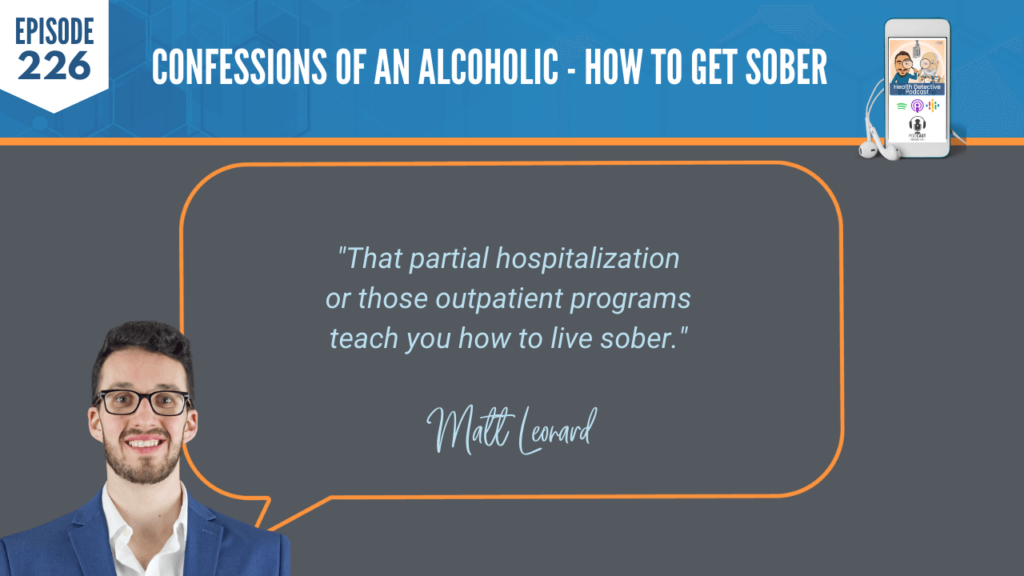
That partial hospitalization or those outpatient programs teach you how to live sober. Because the thing is, I don’t want to say it’s easy to get sober, but you can get sober. But it’s way harder to stay sober. It’s like if you have a bad day, if you have like some sort of trigger or you just get bored, whatever it is, you can easily go out and get drunk, get high.
The thing is, when I got sober and I got to the point where it’s like, okay, go out and get a job now, I had zero confidence in myself. I hadn’t worked in a little bit. The last job I had, I was screwing up, I was slacking off. Again, this is someone who six months, a year ago was like, dude, I have a bachelor’s degree. You know, I’m doing this, I’m doing that. Like I can take on the world.
All of a sudden, it’s like, all right, go get a job at Wawa and I don’t feel capable of doing these things. It’s just like these little baby steps and training wheels to help you, show that you can get back on the right track in life. Since then, I was a general manager at an LA Fitness. I got my personal training certification. I work in treatment. Dude, I’m balancing like three jobs right now, but that’s beside the point.
How to Get Sober: Slowly Introducing You Back into the World
I’ve again gotten that confidence back where I can pursue what I want to pursue in life and I’m capable and qualified to do these things. That’s the advantage of these extended care treatment programs. We’re going to help you get back on the right track. You’re going to get used to living at home or in this environment that’s a little sheltered, but we’re slowly going to introduce you back into the world.

Because a lot of people can get outta rehab, but the second you drive by a liquor store, you’re screwed. Cause you want to go in there. Everything you just worked on for the last 30 minutes is immediately out the window. You need to learn how to cope with that in a real-life situation.
[00:43:37] Detective Ev: I give you so much props for the transformation and giving people some hope. Alcohol in particular, I’m thinking about this more and more. Because a lot of the friends that I knew that struggled with addiction, it was different types of drugs, put it that way.
I’m realizing at least when they left treatment, they know, okay, I gotta go down to Philly now, I gotta go on the block. I’m dealing with some super dangerous people, most likely. I gotta carry a substance that’s illegal all the way back to my place. And although it would be unrealistic for someone to find you in your place, like they can’t just come in your house, I’m still doing something illegal.
There is nothing illegal about driving mostly sober, right? I mean, you have to be under the legal limit. But driving to the liquor store or walking, buying it, going home and getting blacked out drunk every day, it’s a bad decision, but nothing illegal about it.
Where to Find Matt Leonard
So, I’m like, wow, this is even tougher thinking from that perspective. Again, a lot of these people battle like the legal side. Like I don’t want to be popping Xanax cause I know well I could go to jail for this too. Like there’s many motivating factors. The only motivating factor for you is this will to say, hey, I want to live a better life, right? Because it’s cheap and easy to get. So, huge props there.
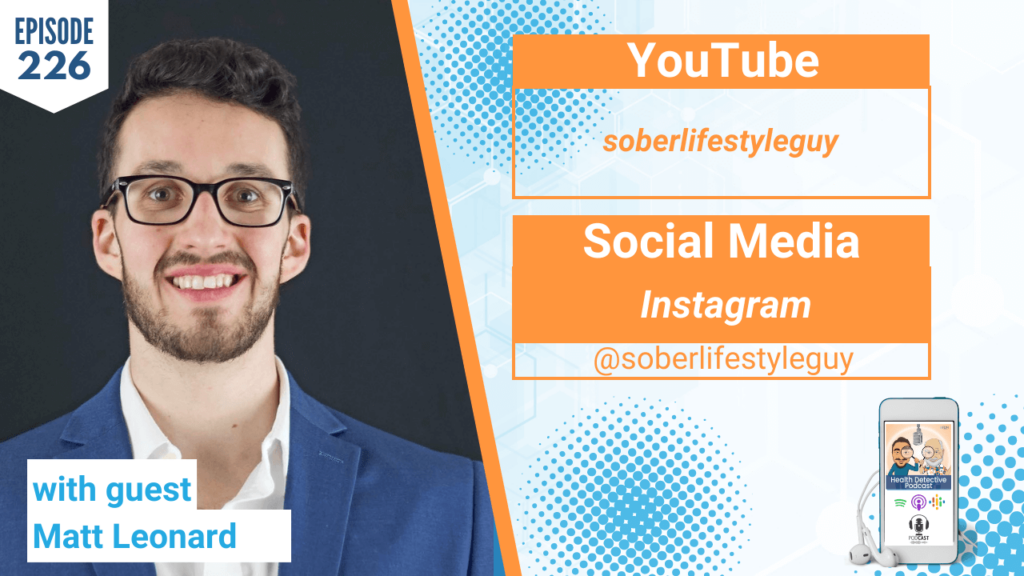
I know we’re getting a little close to time, so please take as much time as you need for this answer because I’m curious. What are you doing with this Sober Lifestyle Guy? I don’t know if you want to call it a brand or what.
What’s awesome about Matt, guys, is Matt isn’t hopping on today like most of the people. It is not that there’s anything wrong with this, people have businesses. But Matt’s not even offering anything other than hope. But he has a page called Sober Lifestyle Guy. I’m wondering what is that and what is your hope for it?
[00:45:04] Matt Leonard: Sorry, it’s just when you said Matt’s not even offering anything, that just sounded like, why are you even here.
Detective Ev: Yeah. I mean, business wise, right?
Matt Leonard: Like what value do you have to provide for us? But no, I know what you’re saying. It was just funny.
Genuinely, I’m just trying to build this brand from the ground up. We kind of touched on this before, but the stigma’s getting better in the world about addiction and stuff like that.
How to Get Sober: Supported Not Embarrassed
But I think there’s a lot of people, particularly younger people, that just aren’t able to embrace their demons. For me, like when I first got sober, there was so much shame involved. Then I slowly started reaching out to people that were in my life, my friends and stuff like that. I was blown away that every single person in my life was nothing but encouraging.
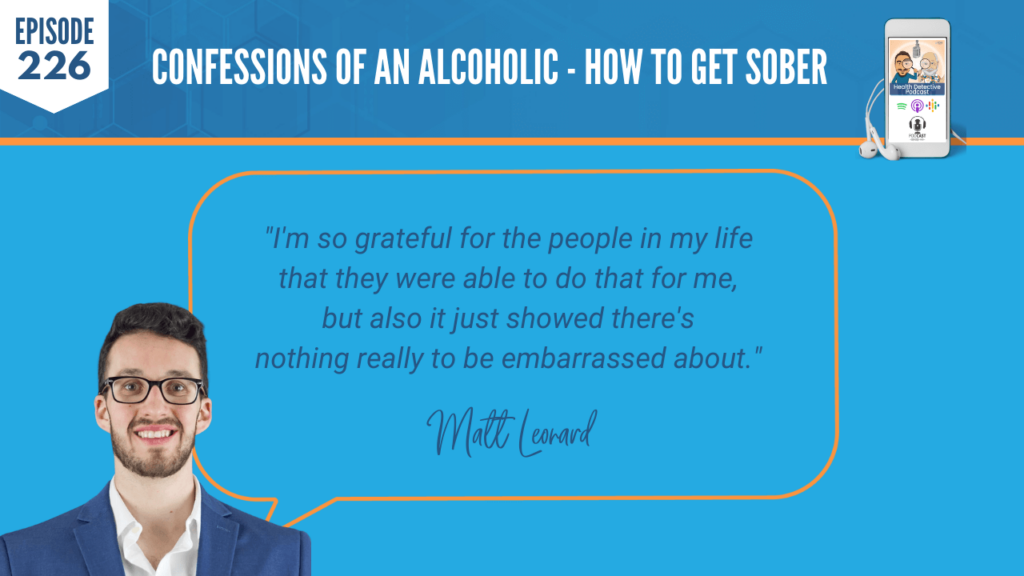
They were like, good for you, man. That’s awesome. I’m proud of you. Let me know if you need anything. Where I thought I was going to be getting these texts back, like, dude, what is going on with you? You’re a loser. How are you an alcoholic? Like, stuff like that. I’m so grateful for the people in my life that they were able to do that for me, but also it just showed there’s nothing really to be embarrassed about.
One of the ways I cope is just through humor. Dude, I’ll be at work, and you know, like something will happen. I’ll be like, that’s it, I’m going to liquor store. Like, everyone around me knows my story and what I do, and I’m not afraid to make jokes about it, stuff like that. I think if I take it too seriously, then it’s just a bad thing for me. So, I like to make light of it.
How to Get Sober: We Can Do This Together

Part of me making light of it is just creating this brand of just saying, I did this thing and if you resonate with this, then come join me. We can do this together. Eventually, maybe if it catches on, I will end up offering something. But right now, I’m just trying to create some content and see if there’s a market out there for it.
[00:46:37] Detective Ev: I’ll have that in the show notes. Give him a follow just for support. I mean, so many of us are entrepreneurs out there doing our own thing. All of us, this is certainly true, the people in the functional world we’re starting from passions, right? Just like you. So, whether or not it’s a completely different situation is fine, but we’re all starting from passions. It’d just be really cool if you showed him some support.
Matt, my final question for you today, and I’m going to reword it a little bit. Cause normally again, we might have functional medicine doctors hopping on, and I’ll ask like, if they could get every single person in the world to do one thing for their health what’s the thing that they would get them to do?
But I, I’d like to switch that a little bit today. What I want to make the question is, if I could give you a magic wand and you could wave it and get every single person who is struggling with addiction to like get them to do one thing, what is the one thing that you’d get all the addicted people to do other than the obvious?
Signature Podcast Question
[00:47:26] Matt Leonard: I have two things kind of for this. One is reach out. You need to talk to people. You can’t do this alone. You have to talk to people and you have to talk about what you’re going through. That’s if you already know that you have a problem. If you’re struggling, there’s always resources out there for places and people that can help you.
The other thing that I would say is if you’re someone that was kind of like me, whereas like, I don’t have a problem, make a deal with yourself or better yet, make a deal with somebody. They’ll hold you accountable, you won’t hold yourself accountable.

Say you’re struggling with alcohol, alright, tonight, go home, open one beer and drink that beer. Or go to the bar and drink that one beer. Can you stop at that one beer? If you can’t stop, if the second you take that sip and you say, ah, screw it, I’ll have another one, that’s probably a pretty good sign that you have a problem. Because you made this contract or this deal with yourself, and immediately the second you had that one drink, everything about that just seemed not important anymore, you probably have a substance problem.
[00:48:31] Detective Ev: Matt, thank you so much for coming on today. Again, it’s a unique topic on this show, but one that again, is needed no matter what industry you’re in. So, I appreciate it man, and congratulations on everything.
[00:48:40] Matt Leonard: Thank you, man. Thanks for having me.
Conclusion
You can always visit us at functionaldiagnosticnutrition.com.
To experience more informative podcasts like this one, go to functionaldiagnosticnutrition.com/health-detective-podcast/.
To learn more about us, go to functionaldiagnosticnutrition.com/about-fdn-functional-testing/.

